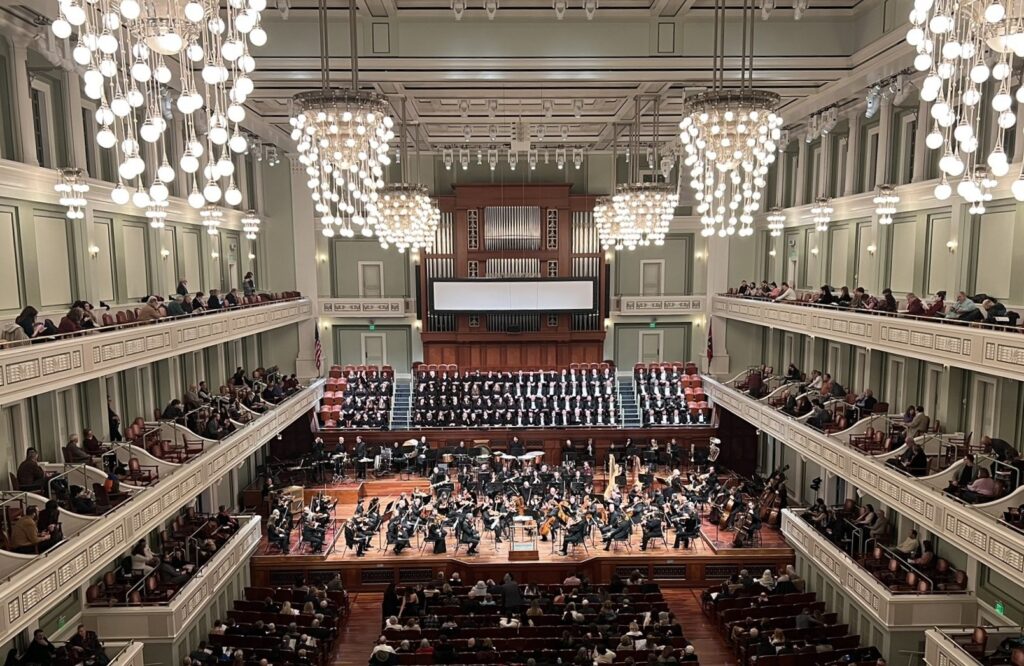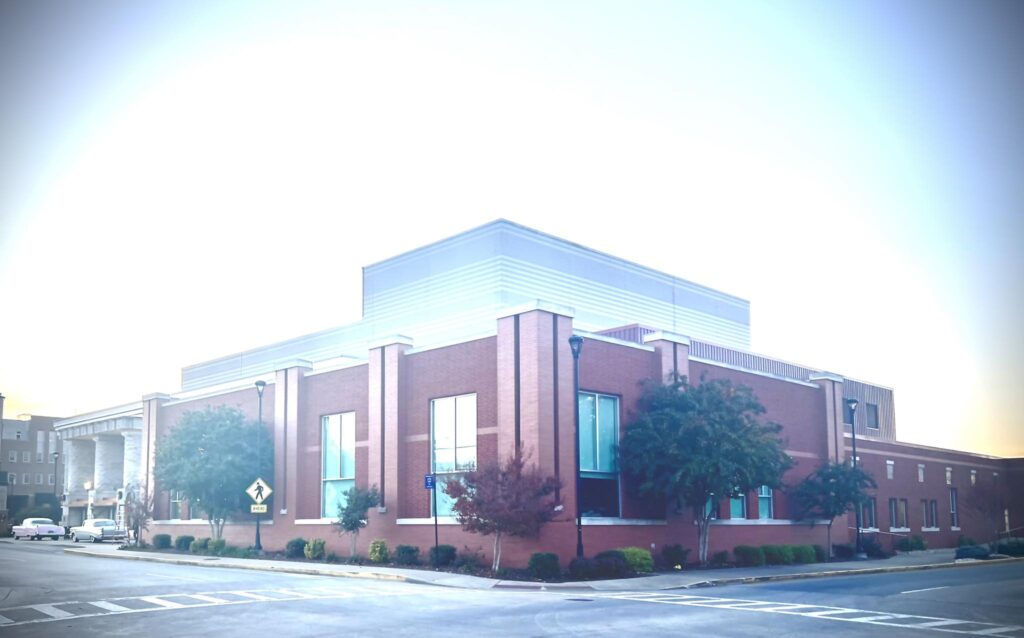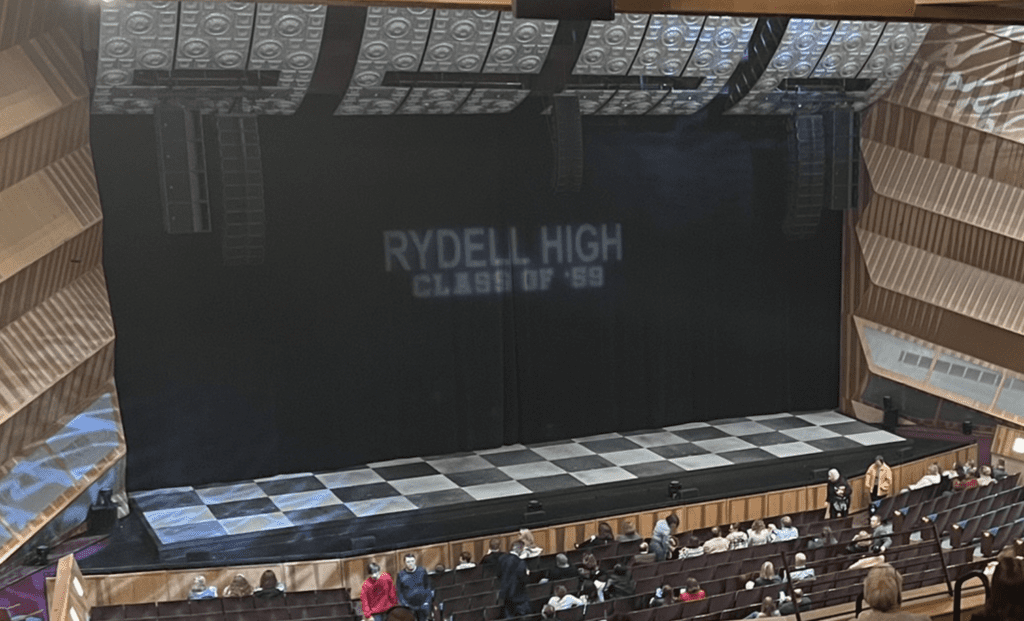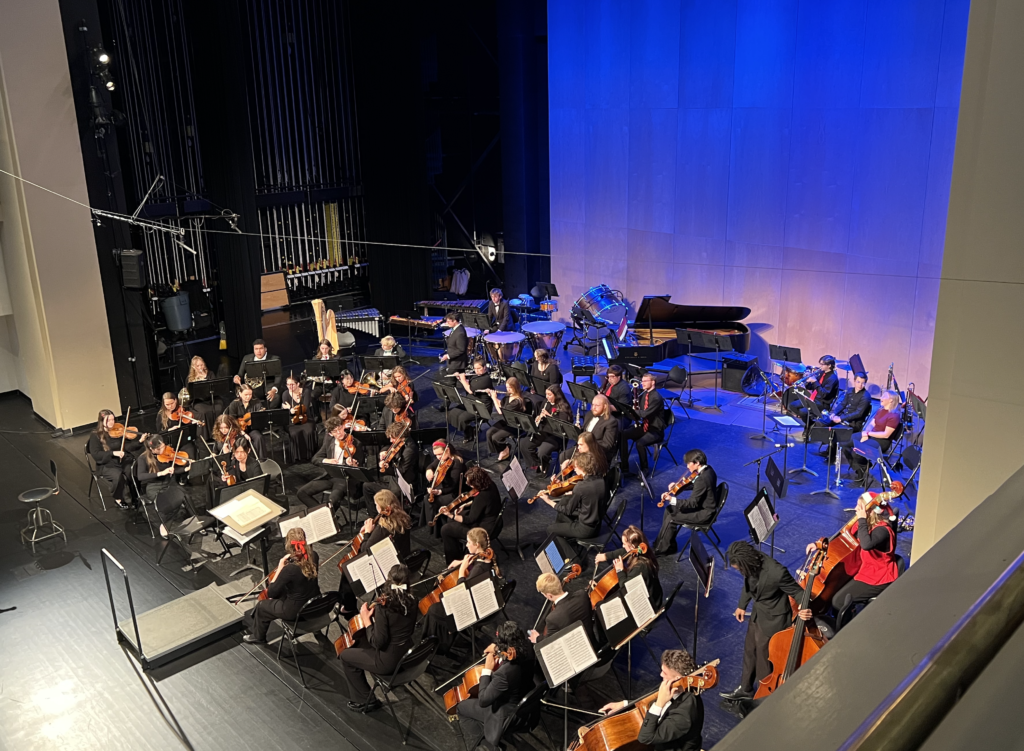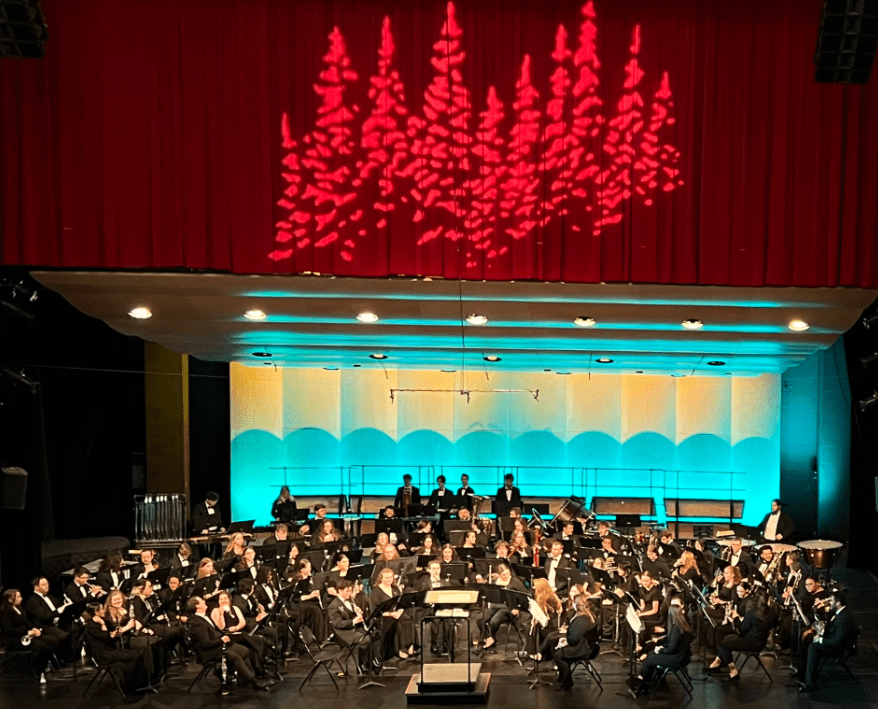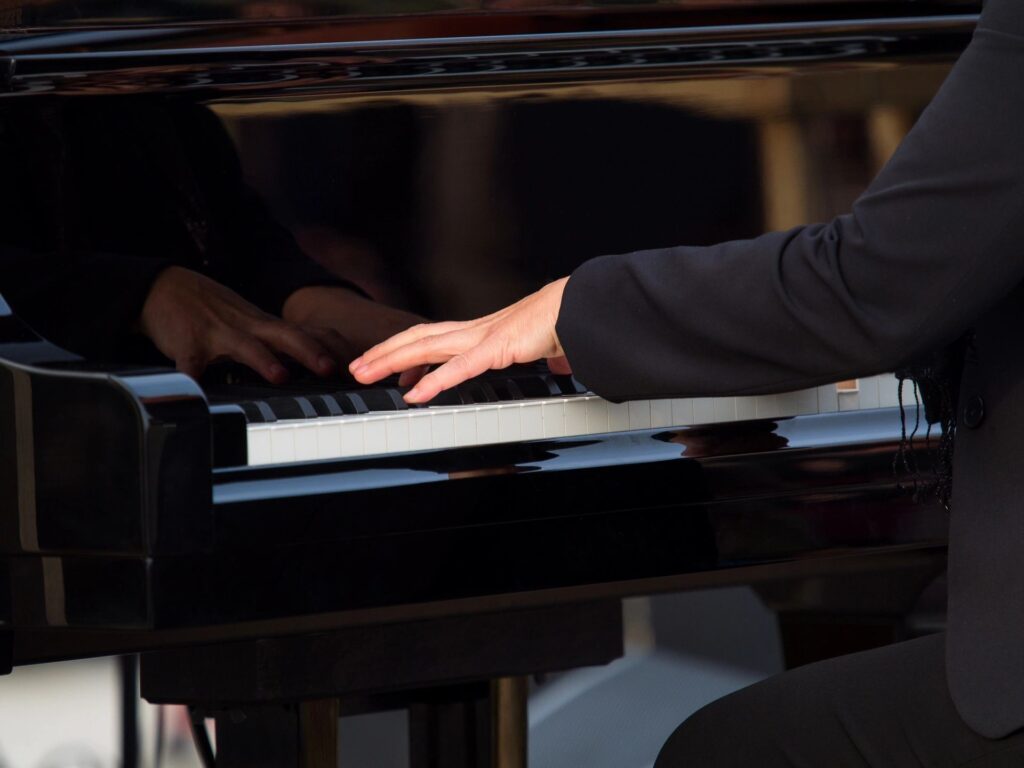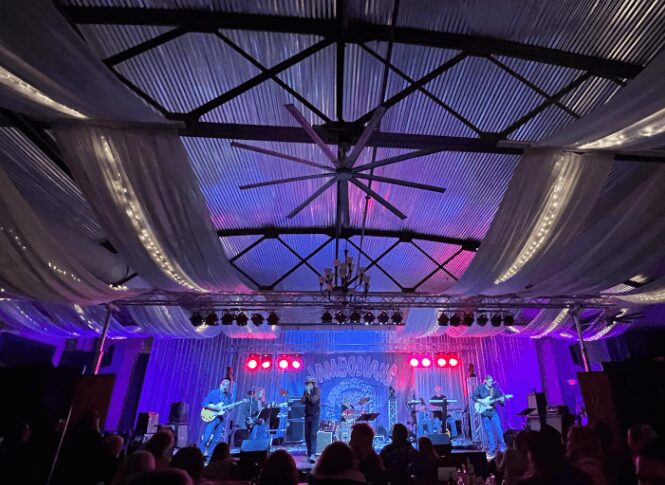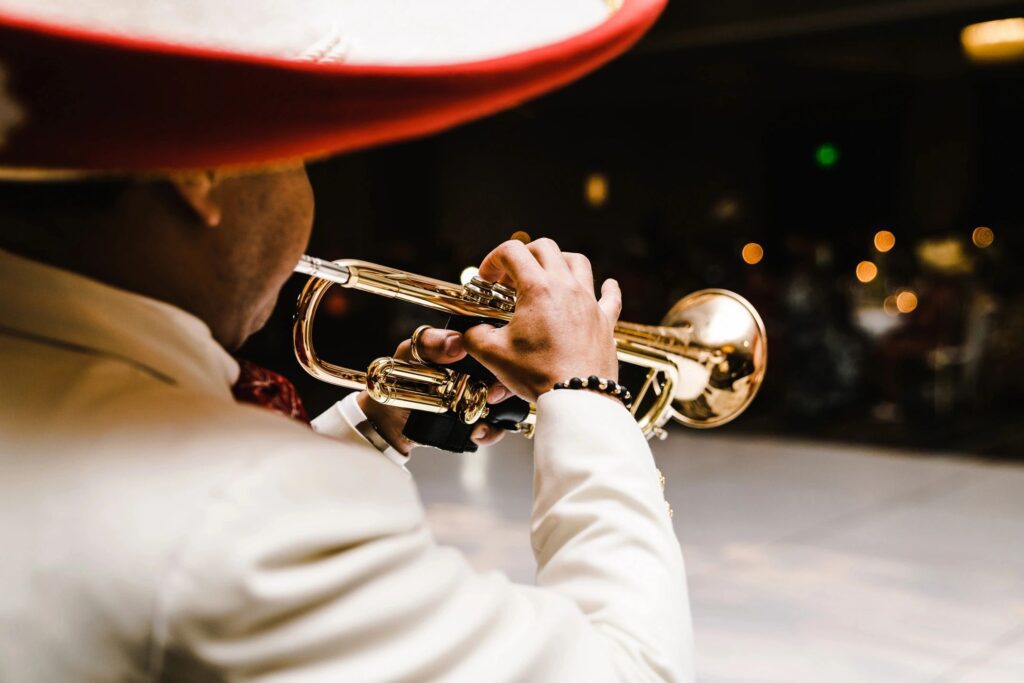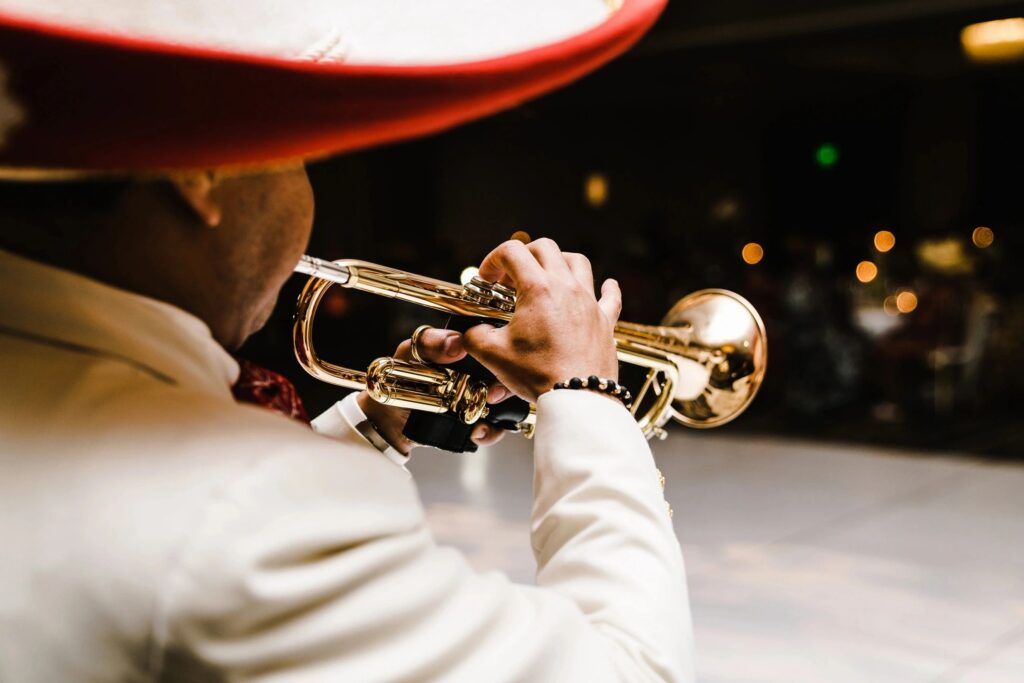Blog
Lorem ipsum dolor sit amet, consectetur adipiscing elit. Vivamus volutpat placerat finibus.
NEW! Events Page on Musiterania
Apr 14, 2025
Musiterania™ now offers the ability to post your events on our calendar for free! We want to help you get the word out about your concert, recital, show, or workshop as long as it is related to music and musicians.
Any event that is listed that is outside of the Musiterania™ world will be linked to their site for ticket sales. Musiterania™ does not have an affiliate agreement with third-party ticket vendors. So that will be up to the event host.
Musiterania™ will be hosting events, live and online, and will share these on the Events calendar. Some may include ticket sales as well as free events. Just click on the link for more information about each event.
Musiterania™ wants to help local music entities be successful by using our website to enhance awareness of your events.
Right now Musiterania™ will be placing as many local events in south-central Kentucky as well as in extended areas when possible. It is the end of the school year so that resource will be slowing down, but there will be plenty of things going on in the summer!
Magnificent Concert with the Nashville Symphony: Mozart and Ravel at their Best!
Jan 12, 2025
Nashville, Tennesse, Schermerhorn Hall, January 11, 2025: 7:30 p.m.
Concert Program:
Preconcert Lecture: Giancarlo Guerrero
Mozart: Overture to the opera "Cosi fan tutte"
Mozart: Piano Concert No. 20 - Emanuel Ax, Pianist
Intermission
Ravel: Daphis et Chloe: Entire Ballet
The great thing about downtown Music City USA you feel like the music is all around you and while sometimes the crowds can be downright crushing, on this winter's night it was simply fun. Going to the world class The Schermerhorn Symphony Center is an event all its own but to witness an absolutely sublime evening of great music is something you don't want to miss.
We attended the pre-concert lecture by Giancarlo Guerrero who poured his heart and soul into is well prepared lecture on the music chosen for the concert. His description about overtures and Mozart overtures were entertaining but he missed a couple of points about it.
While I have to say that Cosi fan tutte is a 'comedy' when you have done it as many times as I have you realize that it isn't just a comedy and that the overture literally spells out "Co si fan tut te in bold letters with 5 massive power chords which are repeated at the end of the opera by the singers. Cosi fan tutte directly translated means "Like that do all women" Cosi (like that) fan (verb meaning to do or make) tutte (all feminine plural)( All women do it like this or all women are like that.)
If Mozart was anything he was a believer in the power of women. The female characters in his operas are strong willed women. The title Cosi fan tutte is often seen as calling out the fickle nature of women but the truth is that it empowers women by saying that women have the power to choose for themselves and they should use this power. This opera is a prime example of the comic ego of males versus the sovereignty of a woman's right to choose who they give their hearts to. This is a brilliant opera and much more than just a comedy. It is a testimony to the question of fidelity and choosing the right partner and sticking with them.
What we did learn was that Da Ponte, the librettist for Mozart's operas Cosi fan tutte, Le nozze di Figaro, and Don Giovanni, played a vital role in American musical history. I had never heard this before and was surprised to learn that he brought opera to New York and the United States as early as the 1830s.
Maestro Guerrero's discussion on the Mozart Piano Concerto No. 20 was no less fascinating. I was not aware that Beethoven often played this concerto and that later in life he composed cadenzas for them. Hearing Beethoven's cadenzas played by Emanuel Ax was very moving. Upon reflection of this I recall often thinking that some cadenzas in Mozart's piano concerto sound more advanced than I would have expected from Mozart. Upon listening to these cadenzas I couldn't help but imagine hearing Beethoven play these pieces. By all accounts, Beethoven's ability to improvise and his brilliant keyboard skills were unparalleled in his time.
The Maestro's discussion of Ravel's Daphis et Chole was equally as entertaining but the topic is very large and he told us to read the surtitles in order to know what the music was representing. This did change the experience as everyone was able to understand what they were hearing while they were hearting it.
Guerrero is an inspiration and a very energetic ambassador for the arts. I have enjoyed every concert at the Nashville Symphony and can only say...."Go to the symphony!"
The 'tricky' part of the overture to Cosi fan tutte is the interaction of the woodwinds. Passing the solo lines from instrument to instrument in this florid music as if played by one person is the real trick. I've heard orchestras struggle to get those virtuosic passages falling together without a break. The Nashville players did this masterfully and if you didn't know just how difficult that is you wouldn't appreciate just how skilled these musicians are. When you go from flute to clarinet to oboe each instrument has a different speaking ability, meaning it takes somewhat different timing for each player to adjust in their playing to get this to work. It's brilliant!
Emanuel Ax is one of the names in piano music that you have always heard. His skills are at this point in his storied career not only expressive and powerful, but also effortless. Mozart is one composer that challenges musicians the most. While being delicate and fine you must play with strength and confidence. This balance of grace and passion is what challenges musicians about Mozart and I would have to admit that I'm not sure how many piano concertos I've heard over the years. The play between the orchestra and piano displayed music making in a palpable way. The orchestra never overpowered the piano and the pianist was never seduced into being a showman but rather a thoughtful and inspired interpreter of that glorious music.
One of the things about Mozart's music is that people don't really understand just what they are hearing. When you go to a concert like this all you hear is Mozart. You don't have anything to compare it to so it is understandable for people to not recognize that if you put a different composer of lesser stature out there next to Mozart, you would immediately get why Mozart is considered in such high esteem...it is because his music is unassumingly divine. It seems so simple yet is so complex and beautifully melodic. If they are playing Mozart ... GO!
Daphnis et Chole by Maurice Ravel is a cornerstone in music. It is required in every Music Appreciation and Orchestration class. It is on every drop the needle quiz. So, while this piece is well known to me I had never heard it live and LIVE is where it belongs. I hope to see the piece in Ballet form someday. It must be something to behold.
What is so special about Daphnis et Chloe? Well it is impressionism at its height. It is an exploration of orchestral colors created by a composer. The Nashville Symphony played with a full contingent of musicians for this massive piece and the chorus effects were not only gorgeous but also chilling. The orgasmic singing at the end of the piece is probably what makes this piece controversial but brings the hours worth of music to its due climax. The fact that they sing no words is actually a relief because 99% of the time you can never understand what singers are saying anyway. With this piece it all about sound and so sound is what it gives in spades.
I'm going to have to alter my symphonic habits. I must start going on Thursdays and write before the run is over so that it inspires people to come hear it.
I had been looking forward to hearing this monumental piece for years and can only say that it is something you have to hear live to appreciate. There are no stereos or headphones that can represent the sound of a full symphonic orchestra in space and time. There is so much to say about this performance but no matter how much I write could I get to every detail that was done so masterfully. From the luscious ocean of string sounds to the brilliant and crushing brass eruptions to the sublime soaring sounds of the solo flute through the space of that hall everything was performed with passion and control so that the full splendor of the music could be revealed.
This was a truly profound evening. So if you missed it...get to the next one!
Reflections: “This is your theater. We perform for you, our dear public.” Taking ownership of the theater and the pride of what you’ve accomplished.
Nov 25, 2024
"This is your theater. We perform for you, our dear public."
Kleine Borgman, Intendant, Städtische Bühnen Osnabrück.
Certain messages resonate deeply, staying with us for a lifetime. One such quote has lingered in my mind for nearly 30 years. When I first encountered these words, I found them perplexing, as I had never viewed theater through that lens. However, after experiencing the performance of "Grease" at SKyPAC in Bowling Green, Kentucky, I'm beginning to grasp the profound significance of that quote.
Describing SKyPAC as a miracle feels like an understatement. During my years performing in theaters across Germany, from major cities to smaller towns, I was always struck by the sense of belonging that audiences felt toward their local theaters. It was always a dream of mine that something like that could be done in Bowling Green, but I never thought it was something people here knew to be interested in, because I certainly knew nothing of such institutions growing up. However, now in my hometown, where once there was no such organization, stands a modern theater that is becoming an integral part of our community’s identity.
I wonder if local residents fully appreciate the impact of this development. People are flocking to SKyPAC for a variety of productions, concerts, and events, and I commend everyone involved in creating this remarkable center for the arts. It is a monumental achievement.
My hope is, that the community and the surrounding region embrace this opportunity to cultivate a shared history and rich tradition, creating incredible memories together as both producers and audiences over the coming millennia. There may not be a definitive recipe for success in this endeavor, but it is a beautiful mess that culminates in performances that spark joy for an evening and leave lasting impressions on the soul.
The arts, particularly live performances, are not without their flaws. Sometimes things don’t go as planned, yet we cherish these moments because they reflect the genuine effort of artists striving to bring something special to life. This vulnerability is a rare gift in a world often dominated by façades.
So, I encourage you: visit your local theater. Enjoy it, support it, become part of it, and take ownership of it. It is "your" theater. It is worth every moment.
Ramsey Theater’s Production of “Grease” Makes the Grade at SKYPAC in 2024
Nov 23, 2024
November 23, 2024: Saturday: 7:30 p.m., Bowling Green, Kentucky, Southern Kentucky Performing Arts Center, Ramsey Theater Company: "Grease" https://www.theskypac.com/
This was my first attendance at a Ramsey Theater Company production and I was very curious to see and hear just what this is all about. "Grease" is a great show to cut your teeth on and it offers the audience a show with music that was a huge part of pop culture in the 70s. I have seen a lot of theater, from the best that Broadway has to offer to great productions by small companies in places you've never heard of. Admittedly, I am not an easy audience, but I am a fair audience...I think.
Having said that...I was overwhelmed by the quality of this production and the performance altogether. The SKYPAC is as good as any theater that I have been to and it has everything it needs to be a first-class venue. The quality of lights, sound, and the ample size of the theater give it a real big time feel. So, if you have never been to Broadway and have no intention of going now is your chance to see good productions right in your backyard. In fact, it could be argued that SKYPAC is bigger and better than many theaters on Broadway.
The good news is that I believe both evenings, Friday and Saturday nights, were both very well attended. I had to take a back row seat in the Mezzanine because everything else was sold. It does my heart a lot of good to see people going to the theater and having such a great time. I'm quite proud of my town having accomplished this monumental feat. Things will only get better and better.
Now, to the show.
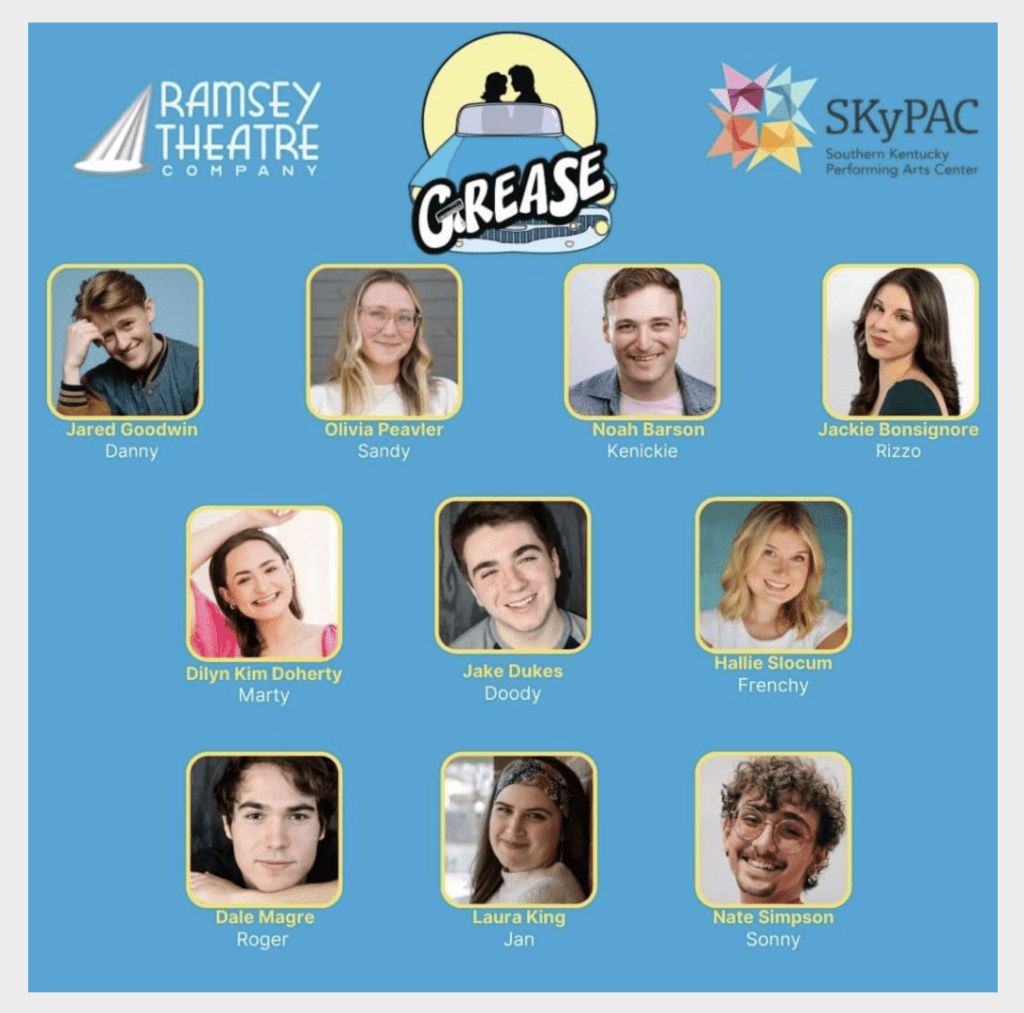
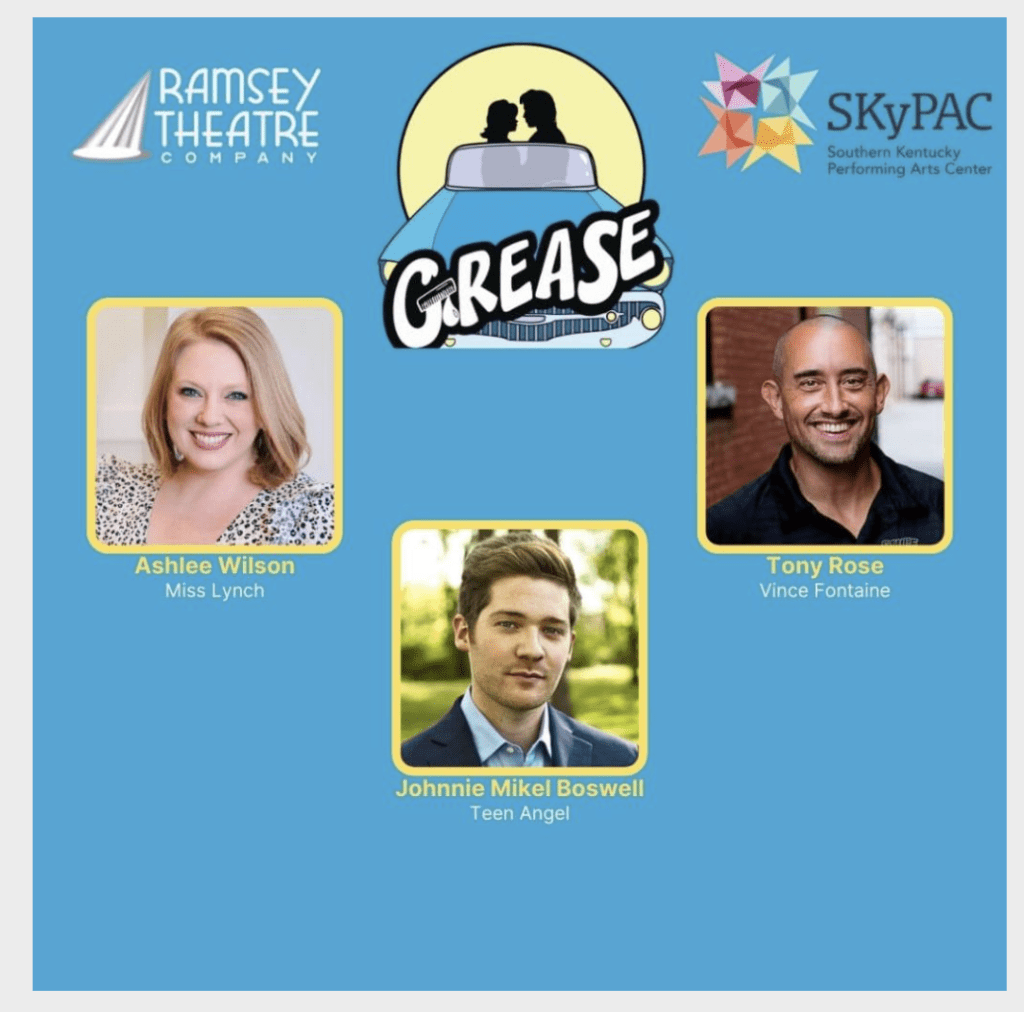
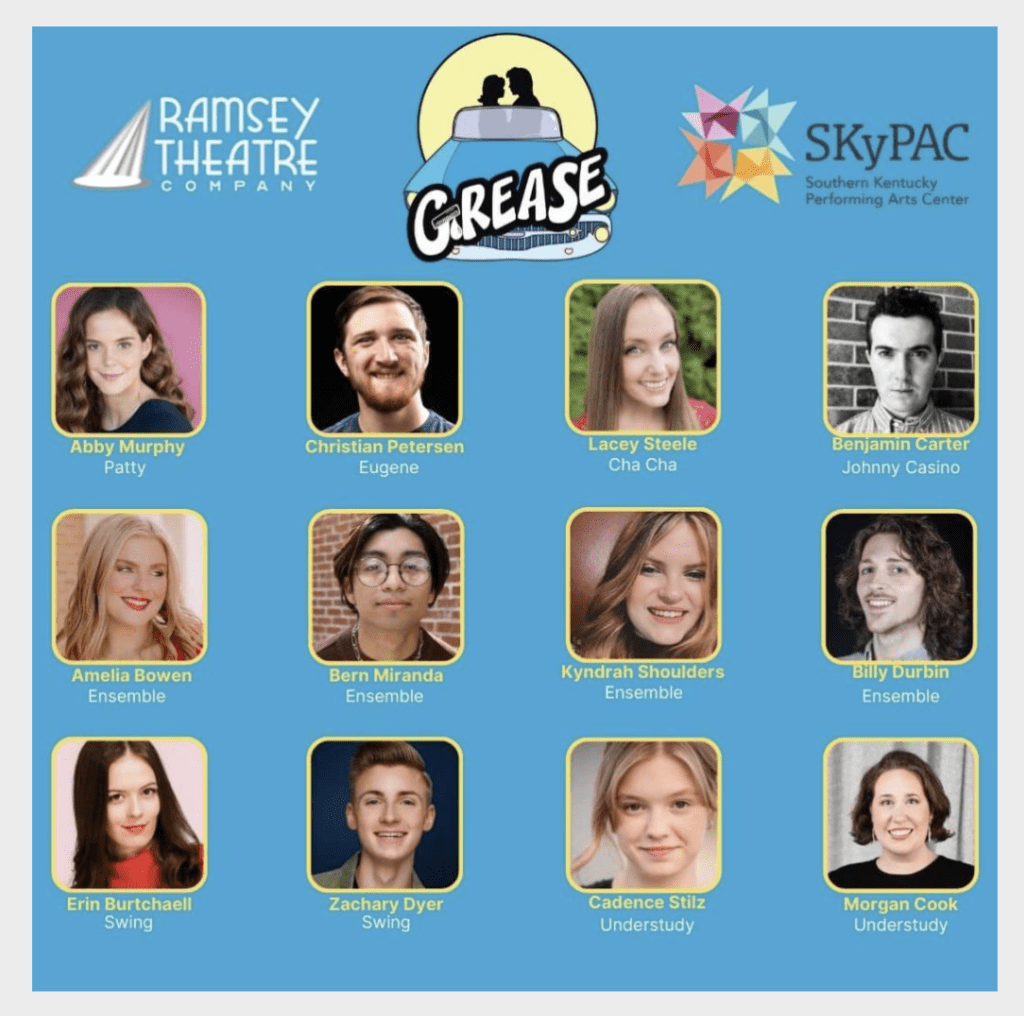
There was no program available and to give credit where credit is due I added these from SKYPAC's website for your reference.
Diane DiCroce, the newly hired Producing Artistic Director for the Ramsey Theater and BG OnStage, directed the show with obvious knowledge and skill for the genre. The show was excellently paced, the dialogues were crisp and the choreography was effective. The characters were clearly defined and staged in a very fluid manner. The show can be graphic for the southern Kentucky audience but it seemed well balanced to give the effect without 'going there' all the way. The set, costumes, and make-up were well done and carried even into the last row of the theater.
Sandy, Olivia Peavler, was well sung and acted performance. She delivered in every sense of the word and wasn't a shy performer in playing a "Shy girl." Danny, Jared Goodwin, met all of the demands of the role vocally and physically. Rizzo, Jackie Bonsignore, is dead on in every facet of her performance. From voice, to dancing, to speaking, her every manor displayed the character as well as it can be done. Kenickie, Noah Carson, was a good ole 'tough guy' to Rizzo's 'tough girl'.
The supporting cast around the quartet was very well chosen and filled their roles vocally as well as in their characters. It was a joy to watch them work so well together in the ensemble piece that Grease is. Dilly Kim Doherty, as Marty; Jake Dukes, Doody; Hallie Slouch, Frenchie; Dale Magee, Roger; Laura King, Jan; Nate Simpson, Sonny; Ashlee Wilson, Miss Lynch; Johnnie Mikel Boswell, Teen Angel; Tony Rose, Vince Fontaine.
Abby Murphy, Patty, having seen her perform several times in the past was a pleasant surprise as the proper nerd cheerleader. Christian Petersen, Eugene; Lacey Steele, Cha Cha; Benjamin Carter, Johnny Casino rounded out the named cast members and did them well.
Ensemble members: Amelia Bowen, Bern Miranda, Kyndrah Shoulders, Billy Durbin; Swings Erin Burtchaell, Zachary Dyer were solid additions to the cast. Cadence Stilz and Morgan Cook are listed as understudies.
The band was on a platform above the stage over the 'garage' doors which was an excellent idea. They were very good but I don't know who they are since there is no program for the evening. They didn't miss a beat.
In the opera Aida they have elephants. I guess in musicals its cars! "Grease Lightning" was definitely a hit and the floor of the stage was a checker board resembling black and white tiles of the classic days at the Ice Cream Parlor. The use of neon lighting and moving sets were both clever and effective.
The question is: "Can I evaluate this production as a professional production?"
The answer is a resounding 'yes'. That is a huge accomplishment, make no mistake about it. It is only a shame there are only 2 performances. It deserves more. Well done, everyone!
Visit https://www.theskypac.com/ to find out more about the upcoming Christmas season offerings and beyond!
Review: Holidays on the Hill! Features the WKU Symphony and Jazz Band.
Nov 22, 2024
November 22, 2024, Friday at 7:30 P.M. CST: Van Meter Auditorium: Western Kentucky University, Bowling Green, Kentucky, USA.
Christmas came early to "The Hill" this year as the final full week of classes was done a week before Thanksgiving as opposed to a week after Thanksgiving, meaning that all of the students will be stressing out about Finals during the Thanksgiving Holiday weekend. It also means that all of the ensembles have to get their semester-ending concerts done before Thanksgiving break as well. So this was "Pre"-Holiday Concert.
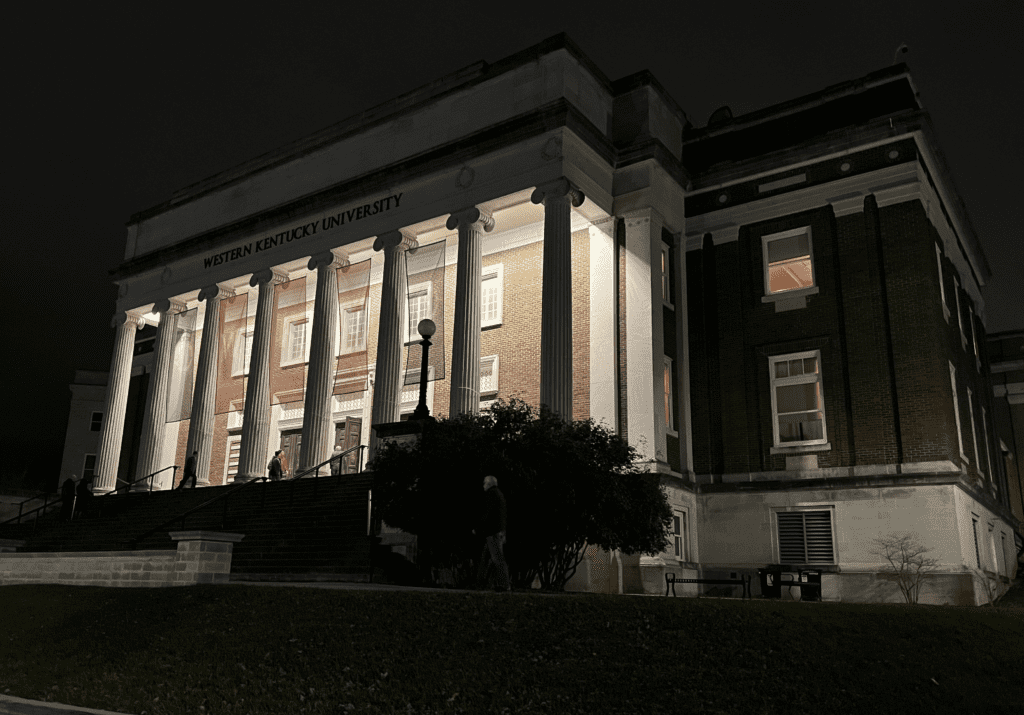
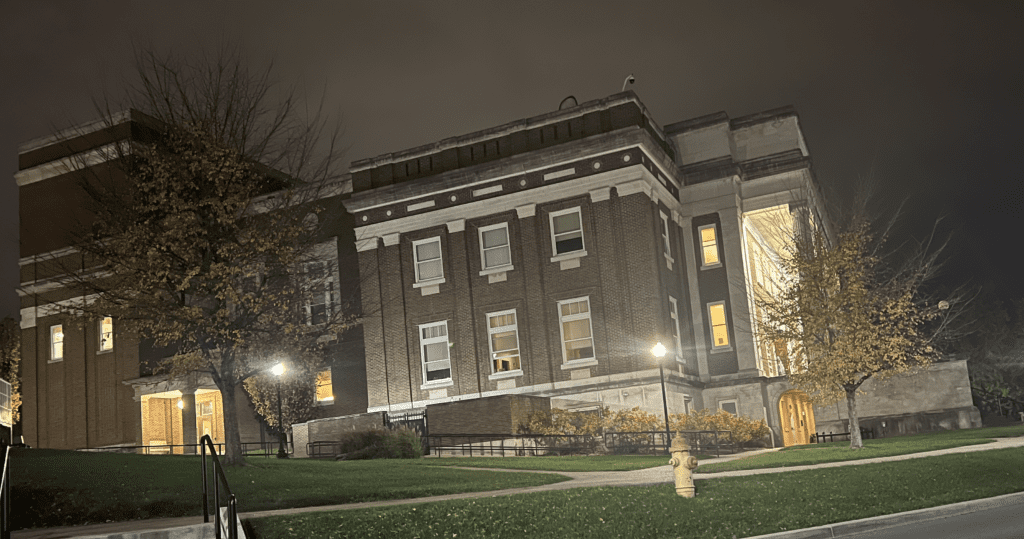
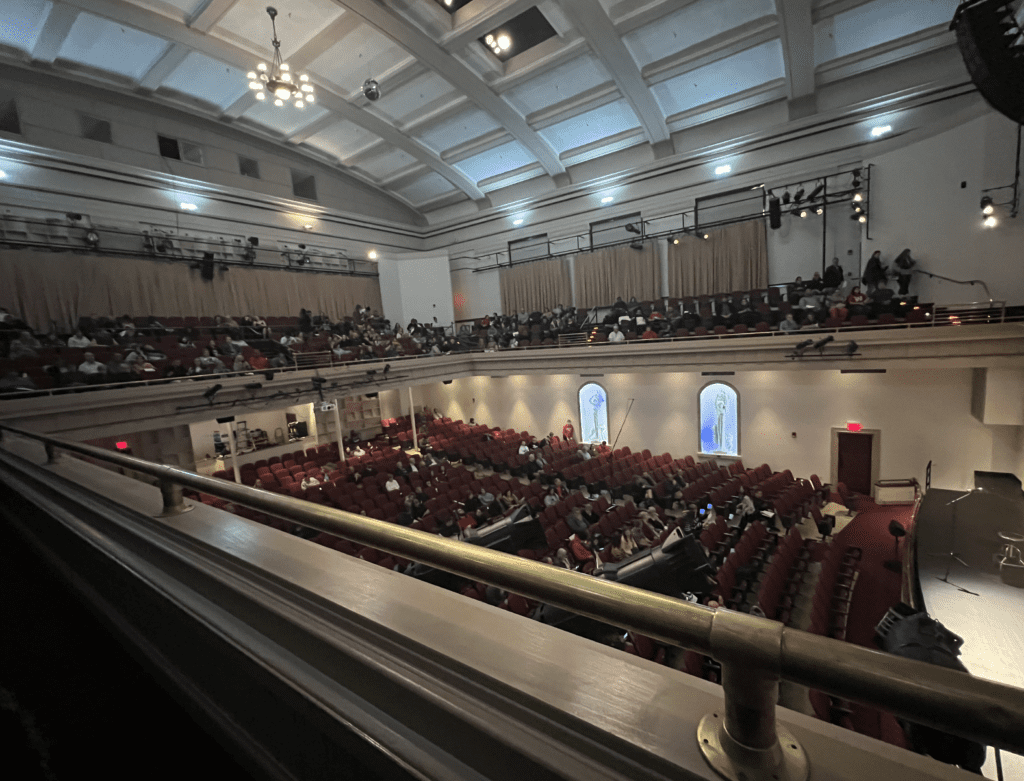
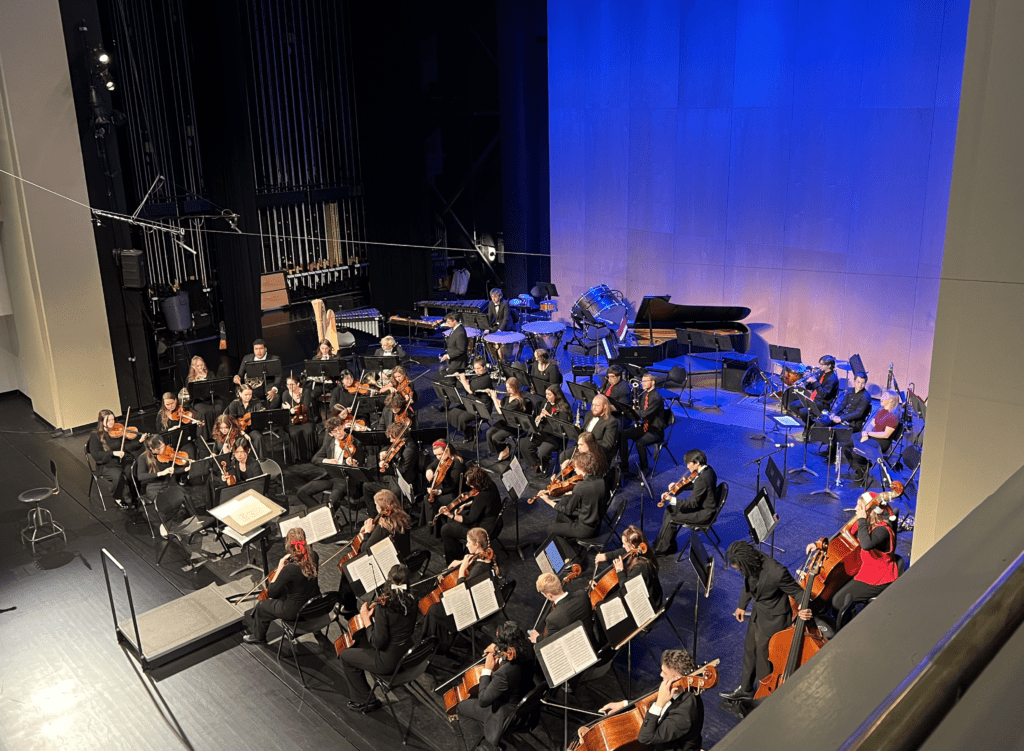
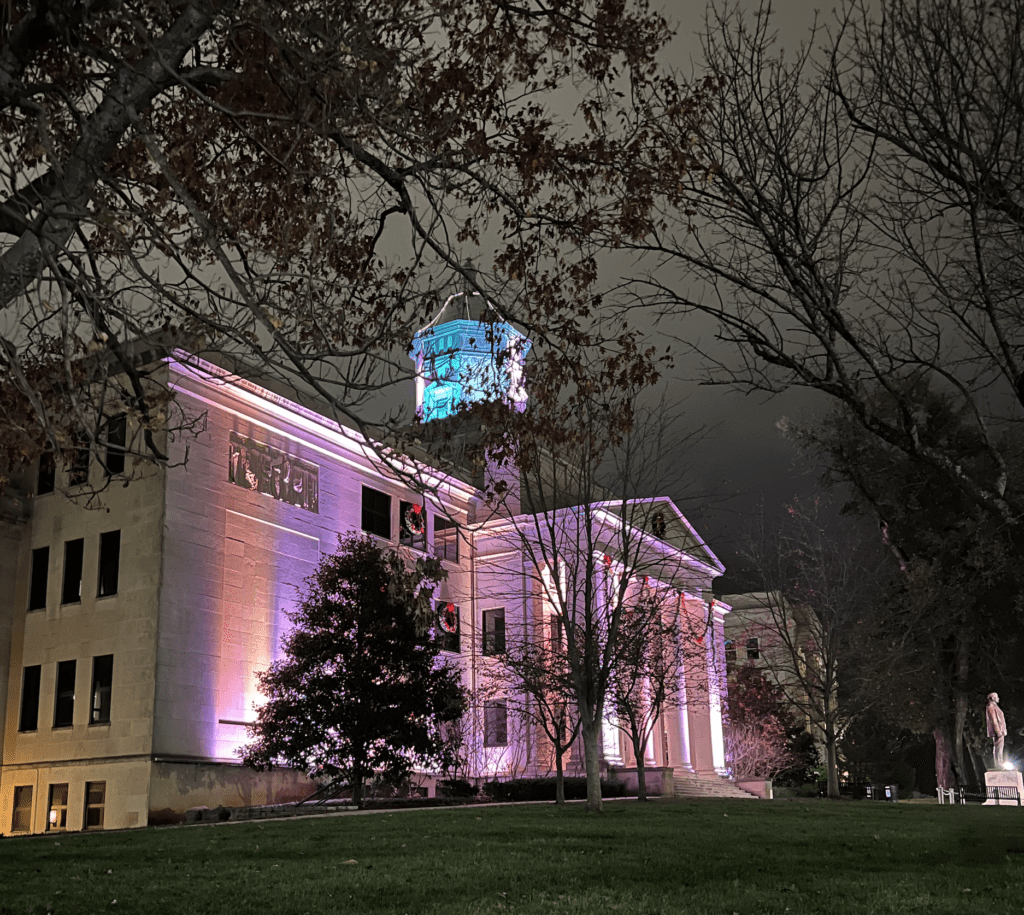
The orchestra was in front of the stage, where they usually are, and the Jazz Band was back in the back corner where the brass section usually sits. Both ensembles shared the stage during the concert and it worked out very well.
Beginning with the challenging first movement of Tchaikovsky's 1st Symphony: Called "Winter Dreams", and the Allegro tranquillo is entitled Daydreams on a Winter's Journey. The orchestra played nicely throughout and was very focused and engaged in their playing. The string sounds are lush with Tchaikovsky and despite having limited numbers the orchestra played well and full.
The Nutcracker for Jazz Band was a welcomed surprise and they played the three sections with enthusiasm. Dr. Sarah Herbert, Director has built quite a tradition at WKU and they play quite professionally.
The ensembles combined forces for Joy to the World in a delightful arrangement with Latin lilt to it. They loved playing it and it was well received by the audience.
Micah Buckham, trumpet, played his muted instrument with style and pizzaz on "The Christmas Song" with the Jazz Band and Jennifer Brennan-Hondorp singing the classic of years gone by. She has a nice, mellow voice for this and was a pleasant performer.
Dr. Paul Hondorp did the honors in singing "Santa Claus is Coming to Town". To me that is usually the last thing on the concert, but since Let it Snow is a duet I guess it makes sense this time. Dr. Hondorp sings nicely and has a good presence on stage.
I guess my favorite piece of the evening was the "Twelve Days of Christmas" Arrangement for the Symphony and Jazz Band. It is quite involved and keeps the percussion players running to their different instruments. I had never heard this arrangement and found it to be quite entertaining.
Jennifer Brennen-Hondorp wistfully sang "I'll be Home for Christmas" and was joined by husband Paul to take the whole thing home with Let it Snow! Let it Snow! Let it Snow!
There were some young students of Violinist Aleka Chau sitting behind me and they had made "We love you Ms. Chau!" posters and applauded her when she came onstage. I'd never seen that before at a concert and thought it was so joyous. What an impact she must be making on those kids. Congrats to her!
The air was crisp, cool, and breezy up on "The Hill" but it is always a beautiful evening to go there for a concert and come out and look over the city lights. I'll never tire of "The Hill" and Van Meter Hall which hold so many memories for me throughout my life.
The concert concluded a little over an hour after it started but everyone left in a cheerful mood.
“We’re making theater”: The Nashville Opera’s Production of Mozart’s Masterpiece “The Magic Flute”.
Apr 14, 2024
"Wir machen Theater!" or "We're making theater!" in English.
The Nashville Opera's recent production of Mozart's timeless classic "The Magic Flute" (Die Zauberflöte) is a testimony to this long-held German sentiment of what it is to 'make theater.' What does that mean and why is it important in this review?
Making theater means putting a show together with the simplest of means to create 'magic' onstage. The magic is moving the audience into the mental space of suspended disbelief where they see things at face value but are willing to buy into the premise to "play along" with the gag, for lack of a better way of putting it. It's "make-believe" in its highest form.
The production in Nashville used simple resources in its production of "The Magic Flute". No fancy, wow-evoking special effects. The use of theatrical drops to illustrate a setting, clearly defined costumes that immediately tell you who is who, and some flashing lights and recorded thunder to imply danger. Within this simple framework, they produced a show that is entertaining, poignant, and above all, enjoyable.
I must mention that the dialogues were in English and were amplified, while the singing was all in German and not amplified. The orchestra was also unamplified. I found the German diction to be surprisingly good and I could actually understand it. This includes the chorus who sang as if twice the number! So, kudos for that! Not all singers carried in that cavernous hall unamplified. Having said all of that I will say that in today's world of blown-up amplification, hearing real acoustical music is a welcomed relief from all the noise.
For the uninitiated, I offer the following description of The Magic Flute in terms of what it takes to produce such a thing. First, the Magic Flute has a huge cast for an opera. I always say that if you want to create a full ensemble of opera singers then you would simply cast The Magic Flute and you would cover every voice type that exists, except a counter tenor...but you could probably work one in somehow...it comes to 15 singers. Plus you have the chorus, the orchestra, and the extras. It is a lot of people. Throw in all of the folks backstage and you have a city of people working together to make such an evening possible. It is no small task. Add to these numbers the fact that these singers cannot be just any Joe off of the street but have to possess not only ample voices but also incredible skill to pull off such a piece of music. The Magic Flute is a tour de force of music, and it seems like a complete puff ball fairytale.
Now, with that in mind to consider the Nashville Opera's resources there are going to be limits on just how well they might be able to pull it off. Where to start???
Let's start with the soloists. In The Magic Flute the show is Papageno's to make. Papageno serves as the comic relief, the regular guy, the "audience member" onstage who has been allowed to comment on the goings ons so the audience feels included in the performance. Papageno is the only character to break the 4th wall of the stage and directly communicate with the audience. Everyone else is "in the story". It requires a decent voice, not necessarily beautiful, but the ability to sing the whole darn thing and to "Act" it is a must for any successful production. Without an effective Papageno...well...it's going to be a looong night. Jesus Vincente Murillo is a wonderful Papegeno and is on pointe the whole night. Some of his scenes were a tad upstaged by the surtitles, but it wasn't too distracting. He sang well and was an engaging performer.
The point of the story is about Tamino's journey from being a young Prince to an enlightened man. Tenor Joshua Sanders is more of a leggero tenor than the lyric tenor that is usually prescribed for the role. He presented Tamino well as the Prince and never tried to occupy the same theatrical place of Papageno, which is exactly what it should be. He sang the role with ease and his voice is pleasing to the ear. To become accepted among the fellowship of brotherhood he must undergo several trials. Holding your tounge, proving your commitment to a woman, showing humility, and enduring the flames and floods of life are all a part of becoming a true "Mensch". He is given a "Magic Flute" to aide him in his journey...not a sword, not a gun, and not a bow and arrow.
Pamina, sung by Jasmine Habersham, embodied the role with all the qualities you look for. She has a certain street-smart wisdom that gives her an advanced maturity over Papageno and Tamino. Her full lyric voice handles the deceptively difficult vocal lines with a beautiful full sound and soft edges. She plays the role with openness and honesty.
As is usually the case, The Queen of the Night makes the biggest splash. The thing is...you either can or you can't sing "The Queen of the Night", there is no 'try'. Rainelle Krause is a "Queen of the Night". I've seen a lot of Queens in my day and she is one of the best I've ever heard in the role. Dramatically she doesn't spare anything in the dialogues to save her voice. She has excellent coloratura, a balanced middle range, and a full high voice. The Fs are all there and in line with the rest of the voice. At the end of the "Hölle Rache" (Hellish revenge) aria of the second act her voice bloomed in the theater, which is what voices should do and so the slancio, that sound that only opera singers can produce, was experienced by those in attendance which was welcomed with thunderous applaus. No wonder she has been hired back for next year's Lucia.
Sarastro, sung by Matthew Anchel, possesses the rarest breed of singer, a true basso-profundo. He has all of the notes. His massive presence fits the all-knowing sage very well and combines the strength of a true leader with the understanding of a wise teacher.
The Three Ladies were well cast with Sabreena Cherrington, Sara Crigger, and Maria De Conzo. They all were very present vocally, harmonically, as well as dramatically varied. The Three Boys were also very engaging and well-sung. Emily Apuzzo Hopkins, Mary Katherine Stewart, and Ivy Calvert were the wise innocents who came in to help when most needed and were very light of foot. In the second act, their main job was to stop Pamina and Papageno from committing suicide.
The Speaker was well-represented by Andrew Payne. The Speaker isn't so much of a singing role as it is a parlando role but it carries a weight with it that he characterized well with his voice. Dee Donasco, Papagena, I found to have a very present voice and great demeanor onstage. The "Reveal" is always a highlight with the duet "Pa Pa Pa...." rewarding Papageno for all his troubles with a beautiful girl..." just like me."
Brian Russell played an engaging First Priest. Monastatos, Jordan Costa, was creatively solved in this production as an orange pot-bellied being with a long braided Fu Man Chu beard.
The orchestra was nicely played by the Nashville Opera Orchestra conducted by Dean Williamson. The singers were well accompanied by Williamson's conducting and the whole performance flowed effortlessly forward. I would have liked to hear more characterization in the playing, but realize that they probably have very limited rehearsal time to bring out such intricacies.
John Hoomes, the Director, made some choices with this production. That is what artists do. I must say that in the beginning, I was skeptical of the approach and the simplicity of the staging. However, it became clear that he went with the theater maxim "We're making theater" and everything became acceptable. That takes courage and belief in your actors to carry the show and not a lot of smoke and mirrors to dazzle the eye. The artistic license taken in the surtitles sometimes bordered on interfering with the real text, however, the fun-hearted spirit of the piece allows for it.
Clearly, singing opera in the original language is artistically preferred. However, I have to say that doing operas such as The Magic Flute would merit doing it in English. I did a lot of operas in the local language, German, and didn't like doing it, but upon reflection support the practice because having the audience understand it also helps!
In general, my feeling is that The Magic Flute is an intimate opera. Producing it in the vast hall that Jackson Auditorium is seems out of place. The orchestral sound wasn't as present as I would have liked, some voices didn't quite make it to the pit, and the distance from the stage prevented seeing their facial expressions. I appreciated the audience's involvement in the performance and the production was heartily applauded.
A wonderful evening in Nashville. I just wished they were having more performances of it. The world could use some sanity.
Concert Review: Holidays on ‘The Hill”: A concert of Christmas music by Western Kentucky University’s Symphony and Symphonic Band, and the Southern Kentucky Choral Society
Dec 2, 2023
December 2, 2023 -
The Music Department at Western Kentucky University presented the program entitled “Holiday on the Hill” featuring the WKU Symphonic Band, the WKU Symphony, and the Southern Kentucky Choral Society under the guidance of Dr. Brian St. John, the Baker Professor of Music, Music Director and Conductor of the WKU Symphony. The concert took place at the legendary Van Meter Hall on Friday, December 1, 2023, at 7:30 p.m.
The concert featured several Christmas favorites that are common during the Christmas orchestral concert season and the World Premiere of an original arrangement by Dr. Matthew Herman, professor of Theory and Composition at WKU entitled “On Christmas Day”.
The opening section of the concert featured the WKU Symphonic Band, Dr. Gary Shallert, Director and Conductor, as well as several graduate student conductors.
The first piece “A Christmas Festival” by Leroy Anderson (1908-1975) for Orchestra, arranged here for Symphonic Band, is a great opener for concerts during the holiday season and will now be a part of a useful repertoire for students as they continue on their music careers.
Introduced by light percussion and a flute soloist in the balcony, “Pat-A-Pan” by Bernard de la Monnoye, arranged for band by Robert Longfield from an arrangement by Chip Davis, is a delightfully rhythmic piece that is Boleroesque in the way that it moves from beginning to end incorporating different sections of the ensemble which maintains a constant beat throughout. It’s canon-like character unfolds beautifully and returns to the flute and percussion as it began. It was capably conducted by Nathaniel Nash, a graduate student in conducting.
Another Chip Davis piece arranged for Band by Robert Longfield is the richly orchestrated version of “Greensleeves”. Ms. Brenna Derby elegantly led the ensemble through this peaceful but majestic Christmas classic. It seems the piece is too short as you want such beautiful sounds to continue. The introduction of the piece provides a pleasant foundation for the piece to unfold. The phrases in the introduction seem familiar but they are new to me.
When “An Irving Berlin Christmas” is played it feels like we have left Kentucky for New York City. Jalen Allred, a graduate conductor, steered the players through the heavy traffic of this urban feel Christmas music. I’m not sure about the intro of the piece as it seems to get off to a rough start. This arrangement of Irving Berlin’s Christmas hit “White Christmas” seems rather clumsily arranged for band and comes to an abrupt end. Not sure this is the best arrangement of the band material.
After a short break to convert the stage for the WKU Orchestra, Aaron Price, graduate conductor, led the symphony in the classic “Sleigh Ride”, another arrangement by Anderson, which is often played at orchestral Christmas performances. This is certainly something the players will meet again in their future music careers. Of course the punch line is the trumpet “neighing” like a horse at the end of the piece.
Dr. Brian St. John admirably led the orchestra through Felix Mendelssohn’s famous Overture to “A Midsummer Night’s Dream”. A cornerstone of the classical repertoire, this piece is possibly one of the most difficult pieces to play in terms of the sheer delicacy of execution and “nowhere to hide” moments that challenge even the greatest orchestras. Explaining that the child prodigy composed the piece at the age of 17, everyone realizing that the orchestra as a whole doesn’t average much more than that helps accept that it isn’t meant for stodginess, but rather youthfulness. Although it is classified under incidental music, no different from film music, it stands alone as a piece that captures the senses and illuminates one’s imagination of the magic of Shakespeare’s masterpiece. It takes guts to play this piece and is not for the faint of heart!
Serge Prokofiev’s “Troika” from his Lieutenant Kije Suite is something you recognize somehow without knowing what it is. Aaron Price, another talented graduate conductor, commanded the orchestra well through this fantastic piece. Prokofiev’s orchestral mastery is apparent in this brief yet rich section of this historic composition. Prokofiev was commissioned to write film music for the film “Lieutenant Kijé” (1934) in the Soviet Union even though he had already been living in Paris and was known to be too experimental for the conservative Soviets. I have often said that a lot of music that is written for film will endure far past the lifetime of the film for which it was written. A delightful piece for sure, and Prokofiev just so happens to be one of my favorite composers.
Dr. St. John returned to the stage to conduct the lush string sounds of Peter I. Tchaikovsky’s classic “The Grand Pas de Deux” from his Nutcracker Ballet of 1892. Tchaikovsky is an “every concert” composer for young string players as they learn to master their instruments in the glorious orchestrations that this composer never fails to supply.
William Mason-Walker, a graduate conductor, led the symphony and Southern Kentucky Choral Society in Handel's famous “Hallelujah Chorus” from the “Messiah”. Dr. St. John gave everyone homework to go and research why people always stand to this piece. The reasons don’t matter and I’ve heard all of them, simply stretching my legs is enough reason for me! But if ever a piece deserved it then this one does.
To end the concert the WKU Symphony and Southern Kentucky Choral Society, excellently led by graduate conductor Demetrious Mason-Walker, performed a world premiere called “Christmas Day” by WKU Theory and Composition professor Dr. Matthew Herman. This arrangement of popular Christmas pieces is certainly a piece that deserves to be among the top Christmas Concert choices for orchestras around the world. It is well composed, is upbeat, has glowing orchestrations, and has some delicious acapella moments for women, men, and mixed choruses. The piece uses the gospel spiritual sound, which gives it a distinctly American sound that is rich in harmony and buoyant rhythmically. I hope to add it to my standards of Christmas music every year.
The audience was enthusiastic and in a good mood. They gave warm applause to all the pieces and were grateful to the participants for their hard work in putting on such a beautiful evening of music. At times the lighting cues were miscalculated which was distracting at times and the decent use of amplification was well-tempered and helped enhance the performance of the Choral Society, which sang and articulated nicely. The Southern Kentucky Choral Society is directed by Dr. Paul Hondorp, Director of Choral Activities at WKU.
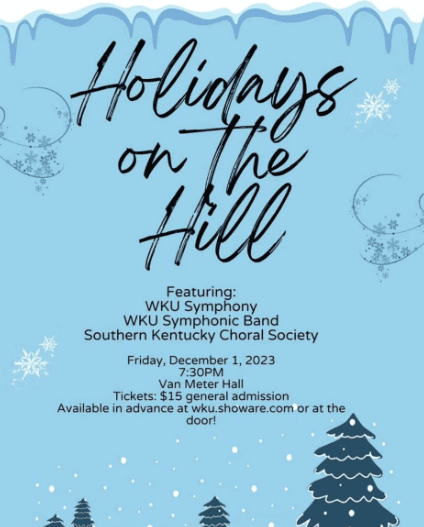
Filling in the Gap: Part of the Musiterania™ Mission
Jul 17, 2023
The realm of music is vast and the part that any individual plays in it varies greatly from person to person. It isn't uncommon for people to be skeptical when you share your idea of becoming a musician because it has always been a really rocky financial road. This is where Musiterania™ seeks to fill a gap in the careers of musicians.
Whether you are currently a musician, have been one all of your life, are considering becoming a musician, or practice music as a source of enjoyment or as a hobby, Musiterania™ is designed for you.
What is important is to be active in your music-making by working with others who share your passion.
Of course, there are many groups and organizations to be joined toward the goal of working with musicians of common interests, but they provide no infrastructure to make it monetarily profitable for you. While we don't love music because it can make us so much money we should still be interested in converting our passion into money if possible. Musiterania™ makes that possible without killing your joy of music.
The argument may be made that it is the struggle to earn a living in music that filters out the ranks of musicians to only those who 'make it' or are 'worthy' of it. However, in my view, participation in music is one of the best things a person can do, and there should be a viable path for those who simply love to make music to also build a living income with it.
In addition, Musiterania™ also encompasses all of the tributary occupations and fields of interest as well. For instance, if you are a huge fan of a certain rock group, and know a lot about it, then you can use your knowledge as a way to build your Musiterania™ affiliate commission income. You can help Musiterania™ build content by posting as a contributing member to the blog and with that attract new referrals.
Musiterania™ is to be used as your artistic home. What does that mean?
An "Artistic Home" is the place where you build your art. One day we hope to have physical locations where you can go and be a part of it in time and space. But, for now, Musiterania™ is to be used as your platform on which to build your career, or at least part of it...the part that lasts, and your income.
Filling in the gap is only part of the mission of Musiterania™ but it is one of the most important gaps there is. Plus, when you participate and help Musiterania™ grow over time, you can grow an income over time as well.
The New Year 2023 and the Need
Dec 30, 2022
This blog post is more like a letter to those who are interested in Musiterania™.
I launched this website several years ago while I was very involved in caring for my elderly parents. I wanted to get to work on the vision of this website while dealing with all of the issues surrounding my parent's care. I would get started, then something big would happen and completely knock me off course. This past year my brother was very ill but has now been treated for his disease with nothing short of a miracle.
During this past year, I have been questioning whether I should continue on this quest or drop it and work on other projects that don't require so many things to attend to.
For myself, it would be a lot less hassle to do this, to be honest. Building such a website, maintaining it, and taking care of all the things that may come up is a full-time job for sure. I'll admit it is much more difficult to do than I had ever imagined.
However, time and again I hear about the issues musicians are facing, not only the normal ones of just trying to make it in music, but the added disaster that the Covid pandemic piled on top of all of that.
The stories I hear are from friends, and acquaintances the world over. These are REAL people who have REAL situations in life that make being a musician really difficult. Everything from people having to do something else to make ends meet, to those who get ill either from Covid or any other disease, or musicians who are finding it difficult to do the things necessary (audition, perform, record, publish, promote) to move their careers forward.
In the realm of music, musicians are a part of things that pull at them, stretching them to their limits. There is no organization that is there to pour into musicians the things that can help them realize their vision. Maybe unions are helpful, and I hope they are, but they don't necessarily help pay the bills.
Therefore I have decided to resume working on this project now that the path forward has been cleared.
My motivation is to provide a safe place for musicians to be and to build their endeavors around. Musiterania™ is like a hub that is the center of the many different areas of a musician's endeavor comes together.
Musiterania™ will do its best to address the problems that musicians face with content pertinent to them. But, a large part of Musiterania™ is that the members also contribute their experience where we fuse all the experiences together into a spring of information available for members.
Creating this network on purpose to make a real difference in musicians' lives is something I feel is drastically needed in the world and is something that I can pour myself into.
Over the past years, there are some rather tragic stories that may not have played out had Musiterania™ been a part of their lives. There have also been missed opportunities to help someone become well-known through the platform of Musiterania™.
It is my job to provide this service and network so that musicians can build their existence into the future.
When I was a singer with the Eutiner Sommerspiele in Germany, I remember the Director of the opera company, Siegfried Grote, getting up on stage and saying ...:
"My heart beats for the singers."
I'll never forget that and it reminds me of how I really do feel about musicians. Not only am I a musician, but I also love being around musicians and I want to be able to provide the infrastructure that supports them.
Be patient with me as I grind through getting all systems going and finally am able to create the income-producing affiliate program that is at the center of Musiterania's mission. Again, I wouldn't go through all of this trouble if it didn't create a reliable residual monthly income for members.
The New Year 2023 brings with it the "Need" for Musiterania™ in the world of music. I am determined to fulfill that need.
How to Use A Calendar and Keep a Log of Your Musical Journey
Jan 22, 2022
This is a piece of "advice" I have for anyone in music, but especially for those who are building a career as an onstage performer or a private teacher. However, this "advice" would be good for anyone really who wants to have order in their lives and remember what they did in life.
No Job too Small
No Venue too insignificant Off the Beaten Track
No Audience to Small
It ALL Counts
Wherever you happen to be in your musical life I highly recommend starting today to plan your musical endeavors with a calendar and keep a journal of your activities in music. While online is a possibilitiy I recommend real pen and paper.
Now, if you are a teacher of music it is something you have to do to organize your lesson schedules and keep track of your income for tax purposes. So, this is one of those things you would usually do if you are professional about it. You would even keep a file, record, of each of your students progress.
But for those who are just starting out or trying to build a career for yourself planning with a calendar and keeping a log of your endeavors is of the utmost importance.
I don't say this because I did it, I say this because I should have done it. Planning and keeping track of your activities is part of being a professional musician. Not only is important to be able to show something for your work thus far, as in a CV, Curriculum Vitae, or a Resume, but it becomes increasingly important in being able to remember your past.
A Calendar is a tool you can use to plan your career. This is especially important if you are an independent musician who has no schedule given to them for the next year. You won't HAVE a schedule unless you MAKE a schedule and that is done with the almighty calendar.
So with a calendar you can plan your year. Lets say you want to earn $50,000 in gross revenue in the coming year. This becomes a lot easier if you create a plan to do that. If you give 5 concerts a month for 10 months and make $1,000 a performance then you get there. If it takes twice as many performances to get there, then do it. For someone starting out that may seem like a huge challenge but is it really. At $20 a ticket, you only need to sell 50 tickets per concert and usually the venue you are performing at will help you get to that number. You create a program, perfect that program and then organize 5 concerts a month in different places and do the tour. Each year you either create a new tour, and/or revisit those venues the every year, building your repertroire, your audience, and your resume. Always record your performance before you go on tour so you can give away your CDs with the price of admission.You can build your Email list and keep your audience informed of your activities using your auto-responder and/or social media, which many savy musicians already know how to do today.
Remember that mastery comes through repetition and by doing so many repetitions of this one program you become a master of it, it becomes easier. Rock bands always do it this way, classical musicians should also do this. Some rock bands have been playing more or less their top hits for 40 years now and still people are amazed.
The practice/performance log/journal is important because it shows you what you have done, who you did it for or with, and your take aways from those experiences. You also build the number of people you know and this is an important tool for your musical future.
"Well, they made it because they knew the right people!"
How many times have you heard this? I know I've heard it a million times from people who didn't "make it" in music. But what kind of an excuse is that? It is a truth if you put it into perspective.
Basically your job as a career musician is to become "known". In other words, if someone doesn't know you, how are they going to be able to hire you? So, what you are doing early in your career is making it possible for people to get to know you. You do this by scheduling your future, taking names, numbers, and addresses of the people you meet and find a way to "stay in touch."
As you move on in your career you will want to spread your wings and try to fly higher and so to do that you have to expose yourself to "more people" so they can get to know you. If you have a proven track record then that is proof that you are dependable. No, at 22 you probably haven't sung at the MET yet, but you have sung XYZ here and there to prove that you have experience. You usually can't make it to the MET unless you have a proven track record through however you can do it. But unless you keep record of that, nobody else is going to.
You are writing a novel called "My Life as a Musician". Keep track of everything you do, the people you meet, and the experiences you have and that novel will write itself. Trying to dig up that stuff from your memory is hard to do.
Having a consistent calendar method, and a journal to keep track of your work are very important tools to building a career in music.
Here are the types of papers you need to keep updating for your work so you will have them at hand when you need them. Don't worry if you don't yet have that much to put on them right now, just get a placeholder for each of these and fill keep updating them as time goes on.
- Keep up to date:
- Biography
- Resume
- CV
- Press Release
- Repertoire
- Venues/Dates
- Contacts
- List of willing references.
- Photos
- Accounting (Keeping track of money)
- How much you spend and on what
- How much you earn and from what
- Keep a folder for receipts
- I would place receipts on pieces of paper and label them and placing them in an accounting notebook, rather than having loose different sized receipts hanging around.
This is called the "Business Side" of the Arts, get good at it yourself or suffer.
Building Your Music “Business”
Nov 10, 2021
It was the mid 1970s when I first got the bug to become a musician. I was already in my teens and so the early development of learning an instrument had already past. I wanted to be a musician but wasn't very good at any instrument except my voice. So I became a "singer".
I had my role models which I saw as being bigger than life such as Barry Manilow, Billy Joel, the bands Kansas, Yes, Styx, Boston and the list goes on. I wanted to be there at that level and honestly had no clue how to do it. Maybe nobody does I guess.
But as chance would have it I got involved in Opera and classical music which is a completely different thing. I went from trying to write songs and learn to be a "Piano Man" and Keyboards player to focusing on learning operatic roles and poetry of songs in foreign languages.
So even though I realized that recording could be an important part of my career as a classical singer it wasn't anything like recording in the popular music genres where it is pretty much what you focus on doing besides getting gigs here and there.
The problem is that nobody around me was considering the importance of recording as a classical singer, because in classical music especially in the 80s was done by the very best in the business, not be young singers to build their name as an artist. That was wrong thinking.
The first two rules of building a music business around your talent is to perform as often as possible and make recordings for the purpose of publishing recordings for sale.
Building a business as a musician is much like building a CV, Curriculum Vitae, for an academic. You want to keep track of everything you do in your CV, or in the musician's case, a resume. You should have a place to keep track of what you have done from the beginning of your career. This can include solos for church, singing in All-State, doing competitions that you have done well in, people who you have studied with, and any place that you perform.
What this does is show your productivity. In the beginning it doesn't matter what you do because everyone begins somewhere and it is important that your resume gets added to at regular intervals.
Writers write articles, books, and create blog posts, builders build houses and buildings, so the medium for developing a profile artistically is doing recordings and creating a discography for your work and to make it findable online today.
To pull from my experience...my wife and I did quite a few recitals together and people really liked them. My idea was to have these performances ready to go and offer them to "producers" so we could do more recitals. Admittedly we didn't work hard enough at finding "gigs" for ourselves. But the one thing that could have enhanced this project would have been to get these recitals professionally recorded and have something to show for what we did. This way we could send the CDs as examples of the programs we were offering, plus also having the ability to earn some income from selling them. We never did that. We never gave our work the chance to be heard by recording companies or anyone for that matter.
So, being a really good musician is not enough to become a success in music. It doesn't do you much good unless folks know about you and can see you in the marketplace on a regular basis.
The other great thing about recording is that it forces you to work on your music in a very detailed way, making you better and better and getting really good at what you are doing.
Do not wait for someone else to make you great. The number one thing you can do to be in control of your musical destiny is to look at yourself as an artist in your own right.
You are Your Brand
Timothy Simpson
I spent my career thinking that the place I sang is what gave validity to my name. "Timothy Simpson" Leading Tenor at the Opera in Karlsruhe. You hear this all of the time in music. So and so is a "Metropolitan Opera" artist. Yes it helps your credibility to have worked in "higher places". But it shouldn't be how you define yourself as a musician.
This is advice I have given to several younger singers who have made a career with their music by being their own brand and I know several others who have done the same thing. Sometimes they may have had to alter their format in music, but that is less important than begin able to be a professional musician in your life and if you build it that way you can always continue to build on it.
I'm telling you this, being a musician isn't about being a rabbit but about being a turtle. It isn't how fast you get started but rather how long you run the race. Everything happens for a reason, but for sure if you stop because your career isn't going like you expect it to then there is no chance to become a respected artist at any level.
In music, like most professions, is about who you know, what you do, where you do it, and how you do it. Networking and getting to know people in the profession in all the different areas is very important. Building your own audience of people who like your music and you as an artist is vital. Fans are extremely important to your career. Take care of them and value them as much as a young bride does diamonds.
People ask if there are things I would do differently knowing what I know now I always say the same thing...become an "Artist" in your own right. Recording CDs, performing for various events, paid or unpaid, shaking hands and being kind to people regardless of what they can do for you are all ways to build your music business.
Here is the truth. Everyone is looking for someone to inspire them, to make them feel good, to believe in, and someone they can refer to in their conversations with others. Every audition is mediated by people who are looking for the answer to their casting challenges. The most important part of an audition isn't whether you get hired or not, it is whether they would want to hire you in the future. You are actually doing 2 auditions at once. One for the gig you are auditioning for and the second is to leave a positive impression with the mediators. Never forget that. You may never actually know what kind of impression you made, but do everything you can to put your best foot forward no matter what.
- How do you build a business with your music?
- Be prolific.
- Record everything.
- Build a resume.
- Grow your audience.
- Grow your network of people you know.
- Plan your career a year at a time.
One of the missions of Musiterania™ is to help you do all of these things using Musiterania™ as a basis for you that will be there before, during, and after your career.
When you are young you can't see the value of the people you meet along the way, but the older you get you begin to understand that that person you were sitting next to in choir became a musical star in Norway is something that you hold on to later in your life.
Musiterania™ is designed to be the home base for everything you do in your music "business" and wants to help you be financially stable over time as well.
Become an associate right now for free by registering on this website right here>>>>>Associates.
No matter what you do, Musiterania™ is here for you in a spirit of Coperor!
It’s now or never. When a musician decides to be a musician.
Jul 26, 2021
I remember when I made the confession of music in my life. It was years before anyone else really knew just how seriously I felt about it. I said one day to my mother, "I don't care what happens to me as long as I can be in music."
At that time I think my subconscious became focused on music and that it determined my life's path more than I realize. I made the statement before I could really play any instrument, know that I could actually sing in front of people, before I understood how music was constructed. I didn't know anything about music other than it called me.
"You don't have music. Music has you."
Professor Ruth Morris, WKU
Ruth Morris likely said this to many students at WKU. She was someone who had many such phrases. But it was true. Even though I had interests in other areas and had declared a major far apart from the artistic world music would never let go of me.
I think musicians are mostly like I was and to a large extent still am. They just want to do music. They don't do it for the money, they don't do it for the applause, they don't do it for the attention. They do it because they simply love doing it and not doing it is like not breathing.
As admirable as that may seem, it really isn't the right way to think about a career in music. Everything anyone does on any level can be a business. So, the mistake I always made was that I didn't ever really look at music as a way to build a business or that it could ever really support me or a family. I was happy just to get to do it, and would do it for any price.
The point I am making here is that once you make the decision to become a musician for your career then you also need to start mapping that out in business terms which is called..."making a living income and building a financial future with it."
Most musicians are independent. They have to make their own business. But, like me most musicians have little to no business acumen. This is not a good thing. Musicians should understand and know business and make plans to succeed financially no matter what level they are working.
There are many ways to earn as a musician. There are also many types of organizations that help musicians build security in their professions. Unions, theater companies, recording companies, educational institutions, and orchestras/bands offer a support to musicians. But, I dare say, most independent musicians don't belong to those institutions.
Most of the people employed in music aren't musicians. When you look at "Jobs" in music, most of them are for business people. Just as in any such organization, most of the money goes to the business side of the entity. A company will have the newest and best computer system but will have pianos that are rumpled heaps for the musicians to play on or rooms that are barely fit for human existence to work in.
Musicians work really hard at their art. But, most don't get paid for that work. Musiterania™ is being created to be one way that musicians can get paid and still have time to work on their music, have an organization that supports independent musicians, and builds a cooperation so that musicians can thrive.
You see, independent musicians all work for themselves, by themselves, with everyone else out there scrambling around to make it too. There is no coordination in it. It is a loose mess, a free for all. Musiterania™ is being created as a "home base" from which independent musicians can remain independent yet be able to work together to build an infrastructure in support of themselves.
Therefore, the principle driver of revenue in Musiterania™ will be through the Membership Affiliate program. I have long searched for a better way to be able to fund musicians, but this seems to be the most affordable, the most lucrative, and the most fair. The plan isn't to build a dependable income overnight, although you could, but to build it over time. The Membership can benefit independent musicians in a number of ways. But none of it makes any sense unless the Members can build a living income with it over time.
Yes, there are Go Fund Me, Pantheon, and any number of "give me money" programs out there, and musicians should raise revenue any way they can, but all of those are dependent on donors. Musiterania™ is a for profit business. It is built on mutual benefit and supporting each other within music, with other musicians.
My advisors are always asking me, "What does a membership give the members?" "Why should someone be a member?"
They are looking for "information products", "physical products", stuff that in the world of commerce that only recognizes a "Product for Money" value. While Musiterania™ is going to offer highly valuable "products" for sale on the website and for the membership to give musicians the best possible environment to thrive in, it isn't only about that. It is about the value of being a part of a larger organization that supports you in ways that aren't physical but make a real difference in the lives of musicians.
My vision for Musiterania™ is that one of the first things an 18+ year old does as a musician is join Musiterania™ because it will become a powerful asset to them for their life as a musician. There is no ambition to be the only thing a musician becomes a part of, or that it should take over their lives. But, to be one source of stability in their musical lives.
For those of you who know that deep down music is your destiny then I would like to offer you a place in Musiterania™ to accompany you throughout your musical life. Visit the "Associates" Tab, register for free, and start sharing your affiliate link with others.
Let's build a Music Paradise together.
The Audience Membership: The “Other Half” of the Musical Equation
May 22, 2021
Musiterania™ is being created as a way for musicians to build an income using the platform of the website. Future plans include a "chain" or "network" of local chapters with facilities so musicians have a place to work, practice, do workshops, and of course perform. It is a bold vision with a lot that can be added to it so the work will never be done.
However, when considering musicians there is a large area that often gets taken for granted and that is the "Audience". It is the Audience that pays for tickets, buys albums, purchases merchandise and travels long distances to experience the music they love. Musiterania™ wants to include the audience in a membership built especially for them.
The Maestro Membership is for musicians ... the new Musiterania™ FAN membership is for those who love music but aren't themselves musicians. The value here is that FANs can earn affiliate commissions through Musiterania™ as well by helping us promote memberships, concerts, events, and certain merchandise sales. We love our audiences, and we must appreciate that the fans that "make the Rock n Roll World go round"!
FANs often know more about musicians than the musicians know about themselves. FANs have been studying music their entire lives and some are quite expert in their knowledge in very defined areas. Musiterania™ wants to harness this powerful segment of Musicdom and let people create content for the website to make all of the memberships more and more valuable. FANs can produce blog articles, photographs, videos, and audio recordings, (depending on copyright laws), and share it with Musiteranians all over the world. By being a FAN member of Musiterania™ they can also build an automatic residual monthly income by referring new and long time members into the membership!
FANs are vitally important to musicians, it is the lifeblood of being a musician and without them music would literally "fall on deaf ears." Musiterania™ wants to make a welcomed place alongside musicians in this world of music we are creating! It will bring a lot of energy to Musiterania™, hopefully a lot of revenue, so we can build the facilities that musicians so vitally need to be and remain musicians for life.
Stay tuned for the opening of the "Musiterania™ FAN" Membership!
Residuals: The Artist’s Cash Machine
May 3, 2021
You've heard about residuals? You know, residuals, those little checks that come in long after the work is done?'
(Read on at the bottom for another way to residuals)
Record a song, it plays on radio stations, you get paid every time it plays and you don't even know it is playing, you just get the check. Or you publish a Record with all of the means out there today and every time it is played, somebody sends you a check.
If you are a Beatle, you are swimming in these checks. If you are Paul McCartney you are worth more than a billion bucks largely due to it.
The problem with it? Creating such a hit isn't such an easy thing to do, especially today.
Keep in mind, that there are a lot of people making money off of those songs other than the creators of it. In fact, the artist doesn't even get most of the money from it. On top of that, to be able to even have a hit at all predisposes the assumption that a company will sign you, promote your music, and give you a shot. Just getting through the front door is a really big deal.
But, having said that, the ticket to all of this is creating music yourself...no...it isn't even that, it is creating boatloads of music yourself. Become a song writing machine. Those who make the truly big bucks are those who wrote the songs, not necessarily the performers of them.
I started to try and write songs by myself when I was a teen. I wrote some okay stuff, but none of it was at that level of being actually good. Plus, I wasn't all that good an instrumentalist to where I could tinker a song into being. I was wanting to write progressive rock songs, which is way too complex if you are just getting started, besides, most prog rock songs are created in the studio at the time of recording and mixed together. So, I was doing it the hard way.
Write simple songs. Simple lyrics, simple tunes, simple harmonies. Write them often and you will get better. Whether any one of them gets to the top 100 is a big "if" and it may not come until you have written 400 songs already and performed for years at venues nice or sketchy.
What can you do in the mean time to earn residuals? That is a good question.
Musiterania™ is built for this purpose. The goal of Musiterania™ is to offer a way for musicians of all kinds to earn a steadily growing monthly residual income over time by helping us build the business of supporting musicians.
Musiterania's concept is to build a network of member chapters in cities and towns all over the country and world to help musicians become successful. What are you getting paid to do? You are getting paid to refer new members into Musiterania™. In the beginning that is all there is to it.
In order for Musiterania™ to be successful, this is the core of what has to happen. Musiterania™ is a platform first and foremost. It is a platform on which musicians can build an income. But that isn't all it will do into the future. Selling your music in the shop, promoting your concerts and the concerts of others by helping sell tickets to them to grow you income even more.
What my mission is as the founder and owner of Musiterania™ is to help musicians be musicians and make a dependable income by working with Musiterania™.
I'll tell you what I am tired of when it comes to musicians.
- Musicians being starving musicians.
- Musicians performing for free. (I am not saying you shouldn't, but I am saying you shouldn't always.)
- Musicians having no organization that is designed to actually help them earn an income while not being an "employee" or remaining independent.
- Musicians dedicating their lives to the art they love and coming out with nothing at the end.
- Musicians working their "Day Jobs", which starves them of their energy and passion for music.
- Musicians being dependent on benefactors, donations, and government programs for their income.
- Musicians being a non-profit entity, which in my view is basically the thing that keeps musicians dependent.
I am doing this because I have had a dream for a long time. The dream is to create a situation where participation in music pays off, and can pay off in a real way even if you aren't Jay-Z.
The goal with Musiterania™ isn't necessarily to make you rich fast, or rich at all, but rather as a secure and stable level of income to support you as a full time musician. Ideally, the network built from this can be a spring board for you into the "industry." and heaven knows every success story Musiterania™ will be greatly applauded!
That is why Musiterania™ is built "For musicians, By musicians." Musiterania™ is like an imaginary virtual world where the people can exist in a world built especially for musicians. Ideally, Musiterania™ will be able to move from the "virtual" realm, into the "real" realm by building facilities in towns and cities which have a membership large enough to build them. In these facilities you will be able to meet, practice, give lessons, perform, record and do workshops. Anything you want to use the facility for will be available to you, no matter where you go.
I have a big vision for Musiterania™ that includes ideas that you will want to be a part of and most importantly be proud to be a part of.
It all lives and dies with the Membership, the ability for YOU, the independent musician, to build "Residuals" based on the people you refer into the company. Your success is Musiterania™'s success.
Here is how you "Do It".
- Get Started: Register as a Member and Purchase the Monthly Maestro Membership that will automatically bill each month.
- Show others how to Get Started. (Make sure they use your affiliate code!)
- Earn a commission on each member you refer every month you and they remain a Maestro Member.
Musiterania™ is doing everything it can to make this as simple as possible.
Make no mistake. You are being paid for performing a very important service to the company. If I had to go out and sign up everyone myself, it couldn't be done, and you wouldn't earn any money. Musiterania™ is paying you to find new members for our community of musicians for the purpose of building a better life for musicians.
How many Maestro Members can you refer over 5 years? 10, 50, 100? More? By doing that and by people staying members, you will be able to earn a higher percentage residual than you would from any recording contract in existence, while still being able to do whatever you want to do in music.
The idea isn't to take up all of your time doing this, no, it is to set you free so you have time and some resources to fully commit to your music.
Here is the motto for our Residual Sales Strategy: "Get started today, help others get started tomorrow."
Steps to Membership.
- Go to the MEMBERS tab and register for free.
- Go to the Shop and Purchase the Maestro Membership.
- Set up your account in Musiterania™.
- Set up your merchant account so that you can be sent money.
That is it. Now show others.
Let's grow this and make being a musician one of the best things to do on earth!
(Disclaimer: There is no guarantee of income. Your income will be based on the number of referrals you make which can be affected by many conditions.)
The other thing I always want to remind Musicians of is that there are many ways to earn income as a musician and you should do as much as you can to do as well as you can and to keep as much as you can to build your financial security. The best way to stop musicians from becoming a starving musician is to not be one yourself! Musiterania™ is here to help.
Straight Line: Asking Questions and Allowing People to Make Their Own Decisions.
Apr 27, 2021
Does the term "Straight Line" ring a bell? Maybe not. Let me jog your memory. But to answer the first question, "Why is he talking about sales on a website about music?" Well, because if you want to earn income with your music, it is an important and vital topic.
The "Straight Line" method of sales is a term made famous by the controversial figure Jordan Belfort in the blockbuster movie with Leo DiCaprio called "The Wolf of Wall Street." For those of you who have watched it you will know it is not for everyone. However it got my attention because I decided to be open to the method he used to take regular guys and create mega sales for his company. Regardless of the fact that what they did was in many ways illegal, unethical, and just plain wrong, there is still something to be taken from it in terms of sales.
I purchased his book, "The Way of the Wolf", which outlines this technique. While there are many intricacies within this method, the basic premise for this sales method is to sell to people who want and need what it is you are selling. In other words, don't try to sell ice to Eskimos, they don't need ice, nor do they want more of it and will get angry if you dog them with it. Just consider the robocalls you get.
For Musiterania™ the "Straight Line" method can be a powerful way for people to build their Referral Affiliate income without doing things that are uncomfortable for you.
It is all about staying within the conversation surrounding the Membership and not drifting off into digressions, which while fun, is distracting and nothing gets done. This is extremely difficult for musicians, because musicians want to talk about music, not business. However, if there ever was a truth about being a musician it is that making and keeping money must be a priority to you or it will never come to you.

The main thing to always remember is that only a minority of people will be interested in becoming a part of Musiterania™ and that as an Independent Contractor as a Referral Affiliate of the Maestro Membership program your principle job is bringing Musiterania™ and Prospects together in an efficient and respectful way.
How do you do this? By "Asking Questions" to determine what they want, not what you want for them and much less of them.
Build rapport by asking questions about them. L I S T E N! Understanding where they are and asking for the level of interest as you go forward, on a scale of 1 to 10, not interested to very interested. Respect and accept their answers. The idea is to move them down the line towards a sale and if they don't meet the levels of interest be good with it, stop the process and leave the conversation on good terms. It isn't even necessary to talk about the program at all if you determine they aren't at all interested in the early stages.
I will develop a script for this to help you. Not that you should use a script, but it is a good idea to know what you want to say before you say it, edit it, so next time you don't repeat the same mistakes twice.
In building a community like Musiterania™ it is important that the good of the members are the center of the focus for the company that you are representing.
I am doing everything I can to make Musiterania™ a musician centered website so that musicians can remain musicians and can as easily as possible refer new members into the company so that they can grow their residual income without a lot of hassle.
Music is possibly the best content there is in the world. Music puts you in front of people. Music gives you a platform to share your thoughts, passions, and beliefs within a mode that is exciting, beautiful, sincere, and moving.
What kind of music do you do? How did you get started in music? What type of music do you listen to? What do you think you need to improve your musical existence? These are the type of questions you use to establish rapport in the early part of the process. The number one goal is to create a relationship of trust and interest that remains regardless of whether they decide to join or not.
Musiterania™ has created the Motto "Coperor" which means to cooperate, work with, mutually support, both within the organization and outside of it.
Musician’s Hell: All Work and No Pay make Jack a Dull Boy!
Feb 7, 2021
There are wealthy musicians. Yes, very wealthy. Paul McCartney, Beyonce, Mick Jagger, Elton John, and the list goes on and on. No doubt, there is a lot of money to make in the music industry. Most of it is made by the business side mind you, but it is possible to earn a good living as a musician.
However, these mega-successes are due to capturing a fad really and while it takes real talent, real work, and real business to do it, the main reason for their success is that they found a huge audience that became cult like fans in huge numbers. Do they deserve it? Of course. Can every musician achieve it? Unlikely.
What's more, aside from the incredible joy and inspiration that all of the great musicians of the past created in the world, what did it do for other musicians who have struggled over the years just to make ends meet? Probably more than I know about, but the fact that I don't know much about it, it probably means...not a whole lot. While I am sure they are very generous contributing to noble causes, something I definitely praise, I'm not sure, or am doubtful, that it does much for all of the other independent musicians out there. I'll give them the benefit of the doubt because I know they know how hard their success was to achieve. But, I want to create a way where musicians can still achieve their independent success but also make it possible to contribute to musicians who may not be able to create that kind of success.
The Coronavirus Pandemic has turned an already difficult occupation into an impossible one. While sports teams continue to play, the performing arts are shut down, taking with it untold numbers of incomes from great musicians and performers of the living performing arts, and with that the entire industry surrounding them. Restaurants, Bars, Hotels, Performance Venues, Instrument manufacturing, Agents, and so on.
The effect of this colossal destruction does some good because it reveals just how vital the live performing arts are to the economy as a whole. The world is losing hundreds of billions of dollars due to this shutdown. It is tragic.
But, really, it only reveals a truth about the plight that independent musicians suffer under 100% of the time. When an independent musician doesn't work as in perform, teach, and gigging, their income goes to a big fat ZERO.
What if an independent musician is in a car wreck, becomes ill, has to take care of a sick child or parent? What if life circumstances make it impossible for them to work? How is an independent musician to earn enough money to live on, much less thrive on?
You can buy insurance and be covered by Government programs, and you should take advantage of those securities offered by society, but nothing replaces real income from a reliable source to have peace of mind to live without having to jump through a thousand hoops to survive.
So while a working musician can make good money working as a musician, it is always in exchange for time and energy and even when they do make an income it is often like working for free, because the time spent doing the actual gig does not account the time it takes to prepare and manage it. Just like teaching a one hour class to a room full of college freshmen takes hours of preparation, especially in the beginning, so does doing anything else in music. That isn't really different for any other profession but somehow paying a musician $300 to play a wedding or funeral for an hour of music seems like too much to the lay person because a lot of people get paid only $10 an hour to flip hamburgers. Plus, out of that $300 comes all of the other expenses and time involved in preparation and nobody sees that.
Being an independent musician is at best a very unstable existence. You piece together your income like the patches of a quilt, run from one thing to the next, and it can all go away instantly at a time when you can use it the least.
Maybe this situation is what motivates independents to hustle to the point to get ahead. After all, much of the great and exciting music created in the world came from the unrewarded world of musical creativity where you put yourself at risk of poverty to create the art you are so compelled to follow.
With Musiterania™ I am working on solving this issue with independent musicians because I am one of those musicians who lost their livelihood in music for reasons not even I fully understand.
My goal is to find a way to get independent musicians paid on a consistent monthly basis as if they had a job.
I have looked at every possible way to achieve the paying of independent musicians fairly while helping them in their music careers, no matter what that is.
The best way that I can find to do this is to offer an affiliate program in Musiterania™ Membership program. Instead of hiring people to grow the membership, I have chosen to pay commissions to fellow independent musicians on an independent contractor basis for referring new members to Musiterania™. This way you are working for Musiterania™ but not as an employee but as a partner. Also Musiterania™ helps you promote you as a musician as well.
The symbiotic relationship combined with a cooperative effort to build a network of chapters of Musiteranians in cities and towns everywhere can provide support and social proof that Musiterania™ be a safe haven for independent musicians while not retarding their independence.
The central mantra for Musiterania™ is "Coperor". What does that mean?
It means that the company Musiterania™ isn't in competition with any other musical entity that exists, but rather seeks to bring them more prosperity.
By being associated with Musiterania™
any type of entity can join as a member,
be an independent affiliate
and earn commissions by helping our membership grow.
But, again, the specific focus is on individual musicians, and it is the needs of the independent musicians community that Musterania™ is built to serve.
During the time of the Coronavirus musicians are not earning income. Musiterania™ wants to fill the need for security for independent musicians because it is really difficult to earn income as a musician when you aren't allowed to perform.
Yes, virtual performing, and teaching are possible today, but it doesn't get anyone to security and stability like a program like Musiterania™ can make possible.
Yes, it will take some time to get to a living income with the Maestro Membership at Musiterania™, but when you get there how valuable will that be for the independent musician.
Musiterania™ is designing into the website ways to refer new members that make it a very simple process and we show you how to make everything official in very few steps.
The work of a Maestro Member in Musiterania™ lies in sharing the website with those they associate with. Once they arrive on Musiterania™ with their affiliate code securing that referral to them, it is Musiterania's job to bring them into the fold, secure payment, and payout to that referral affiliate the commission entitled to them for life through that referral relationship for as long as both remain members.
Musiterania™ wants its affiliates to earn as much as they can but not to become a professional affiliate but rather spend more and more time being a musician and doing what they were put on earth to do. So, being a referral affiliate is somewhat like a "day job" except you set your own schedule and your level of work. But, please, stay a musician.
Musiterania™ is built on the idea that being involved in music in any form is a great way to live life. Certainly the more people being involved in music the better it is in society and ultimately, a computer program or robot can't do what a musician can do because they have no soul, no thoughts, and no emotions to make music with.
Musiterania™ is dependent upon you for its growth and it wants you to depend on it for providing you with a consistent reliable income. Interdependence is a powerful way to build a company.
Join Musiterania™ today, help someone join tomorrow!
Tour with the Musiterania™ Network
Jan 23, 2021
One of the main ideas behind the creation of Musiterania™ is creating a network of local chapters of Musiteranians to offer members opportunities to perform in concerts and recitals, do workshops, and masterclasses.
Over time the number of chapters will grow as will the membership. As it grows the network to be created is at it's core a closed network, meaning, just for members. But, of course any performances or events can be opened up to the public for the cost of admission.
This makes it possible for venues to use Musiterania™ as a way to get folks into their business, build their clientele, sell more of their stuff, and get return business as well.
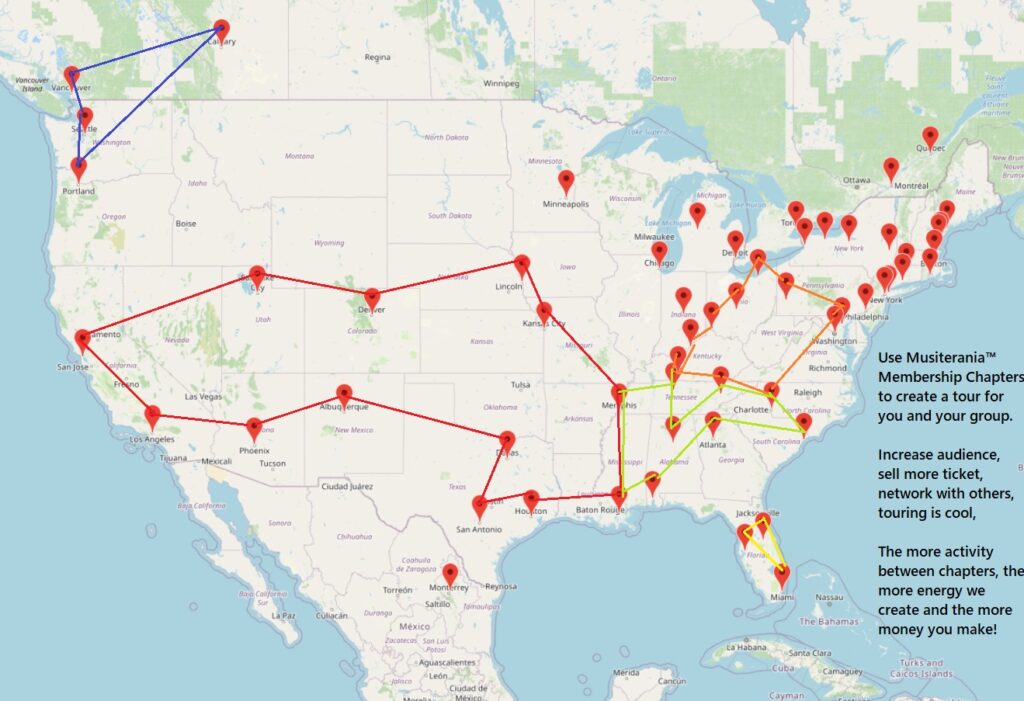
The map indicates what it could look like over time. Using the Affiliate based Ticketing system, it would make it possible for you to earn commissions sales of tickets of other musician's events, in other locations, and for different reasons.
It will also become possible to do larger venues, and create more income through commissions from the sale of tickets.
Lets say a Musiteranian creates a performance that sells 1,000 tickets at $30.00 per ticket, which is very reasonable, then the commission could be say 25% of the sale for referral affiliates, or $7.50 per sale, and if you refer 20 that would be $150 in commissions from that one concert! Refer 200 that would be a nice little $1500 payday, and all you did was tell a lot of people about a concert they would want to go see anyway!
The point here is that by being a Maestro Member of Musiterania™ you will be able to open up new doors of ways to monetize your involvement in music. Until now, there was no such cooperative system available for that.
One of my visions for Musiterania™ was that the people who pay to attend concerts can also help sell tickets to those concerts and not only pay for their tickets, but earn more by being an affiliate in the Maestro Membership program in Musiterania™.
Coperor! Cooperation, working together, and coordination of a group committed to the success of their fellow musicians.
Musiterania™ is looking for chapter leaders anywhere in the world. Create a Chapter for Musiterania™ build your chapter's membership and earn those commissions, and help your chapter grow by helping your members earn commissions as well, so their membership is paid for by their commissions, ensure a long life span for each membership.
Get started today, help others get started tomorrow.
The Challenge of the Referring New Members
Jan 13, 2021
Look...I get it. Believe me I do.
You are thinking to yourself that "there is no way I will ever be able to refer enough new members to Musiterania's Maestro Membership to create enough income to pay for my expenses."
The other thing you are thinking is, "I'm not a sales person and I don't want to "hit up" the people I know to ask them to join so I can make money."
Plus, you are thinking of a million reasons why it is difficult to refer new members into Musiterania™. I probably know them all.
That is why Musiterania™ wants to help you build your income as much as possible so the challenges that face people in referring new members are fewer and completely doable.
The job of an affiliate marketer is really only to bring eyes to an offer, in this case musicians eyes to Musiterania™. Once those eyes are on Musiterania™, it is our job to close the sale.
It is our job because the business relationship is really between the customer and the company. The customer pays the company, the company manages the process and is responsible for the quality of experience a customer has.
Now, just to be clear, if you are an affiliate marketer and you want to market multiple things, then yes there is more to do in building a list, staying in contact with your list, building a relationship with your list, sending your list valuable content, and to create business based on that.
If you want to do that fine and we welcome affiliate marketers who do that as their primary business. But that really isn't the idea behind Musiterania™ for it's affiliates, because at Musiterania™ we want to support your activity as a musician.
The "club", "network", or "culture" of Musiterania™ is based on building an "ensemble" atmosphere with fellow musicians you know and to help musicians you don't know get to know you if they don't already do.
Relationships are at the heart of Musiterania's affiliate program. It is about inviting a fellow musician to become a part of something that can help them in a real way.
But, lets stay clear about one thing too...being an affiliate with Musiterania™ means you are an independent contractor working with Musiterania™ on a purely commission compensation basis. Musiterania™ pays commissions to its affiliates because they do a real service for the company. Marketing.
The challenge of being a Referring Affiliate Maestro Member of Musiterania™ really is to get your mind to agree that what you are trying to do is a good thing to do and doesn't take up a lot of time and effort to be successful at it.
To do the act of referring new members to Musiterania™ really all you do is to hand someone your membership business card and say "I want to invite you to join Musiterania™. Here you can find all of the information you need to learn about it." You can add, "I'm happy to answer any questions you have but that really isn't my job, and if you are interested in being a member, you will not want that to be your job either. We are musicians and spend our time on our music, not on explaining things about Musiterania™."
The Directory, the Profile Pages, Musiterania™ events such as recitals, concerts, and workshops, are all ways that Musiterania™ can help you grow your referrals and your commissions on its own.
A lot of affiliate program companies don't do much in the way of promoting itself to the broad population, but Musiterania™ is going to do that so that the brand is trusted in the marketplace because people have seen it already somewhere. When it becomes something that people have seen and are curious about, it makes it easier for the referral affiliate to approach someone about it and it is more likely that people will look at it on their own, find you because you have something in common and can join through your affiliate code, before you even know them.
We are trying to make the process of referring new members as automatic as possible.
What is one way we do that? We offer a link right in these blog posts that can be shared where people can go and become a member right now. Simply click here and place your email address in the space provided and the name and/or affiliate number of the person who shared Musiterania™ with you. Go to your email inbox and get your password and log in!
That's it. To become a Maestro Member simply purchase the membership and follow the video tutorials to get your account up and running.
Coperor: The Spirit of Musiterania
Dec 8, 2020
I write this article to inspire the spirit of "Coperor" inside the realm of Music and especially Musiterania, because it is the lifeblood of it's existence.
Musiterania will become a source of structure and stability for the independent musician when everyone who sees it for what it is meant to be, a cooperation, not a competition.
This begins from the very first time someone comes in contact with Musiterania because unless "Coperor" is at the heart of the message then the message is getting lost.
If people come to Musiterania with an attitude of mistrust, skepticism, and fear instead of an attitude of contribution, belief, and enthusiasm, then Musiterania is not for them. I'm not saying to not question things, I am saying that a negative mindset and a selfish attitude will not be a good fit in Musiterania.
It is all about this really. Let's be honest. Asking someone to take a look at Musiterania is the job of an affiliate member of Musiterania. S-ICE Marketing LLC, the company that owns Musiterania, pays affiliates a commission based on the revenue from commissionable products, for now the Maestro Membership, they make possible. So yes, an affiliate is asking you to take a look at something that can make them money, which of course is the entire point of this company. If you have a negative feeling towards someone doing their job for this company, then you really will have a difficult time with Musiterania.
Joining Musiterania means to believe in the mission of Musiterania that we must approach it with a spirit of "Coperor", cooperation, combining, and working with. Cooperation is first a commitment to contribution, and in the case of the Affiliate program, it is a monetary contribution, not only to Musiterania's mission, to be an infrastructure of support for Independent Musicians, but also to contribute to a fellow Independent Musician in a meaningful way.
Music is a cooperation. It is contribution combined with benefit. Musicians must be good audience members as well as good performers. We support other musicians in their efforts because we all know how difficult it is and we want to give energy to their endeavors and we also appreciate it when others do the same for us.
One of the most pervasive attitudes in Western culture is that winning is all important. This creates an attitude of competition, of me against you. If I am going to be successful I must win, which means someone else has to lose. While competition to be the best elevates performance in some ways it also creates negative feelings in other ways.
In the dog eat dog world of music, competition is pervasive. This is true no matter what anyone says. With Musiterania the very idea of the concept is to have a place where this isn't the case and that Members are here for the right reasons: to give, to support, to share, and to invite.
I want to say to someone looking at Musiterania to be excited about the things it can do for you, and not what the Membership fee will cost you, because the bottom line is, you are contributing to three worthy causes...
1. Musiterania.com the company that makes it all possible.
2. An Independent Musician who is working on their music endeavor.
3. Your own mission as an Independent Musician.
I wrote in my book "Boredom to Brilliance" that a gift is not something we receive, but something we have that only has value when given to others.
As talented musicians we have been given the gift of musical talent. It is only a gift because it is what we have been given for the purpose of giving it to others. By giving it to others we can also receive other gifts in return, like applause, appreciation, admiration, friendships and also money. This is the "Coperor" spirit.
If I had one thing to say to Maestro Members of Musiterania, it is that your job as an Independent Contractor or "Affiliate", is to give fellow musicians the gift of Musiterania by inviting them to take a look at it and to be a positive ambassador for it as well.
If you are reading this and want to join Musiterania, simply go and register under the Member tab on this website above, and register for free. Then purchase the Maestro Membership and you are then qualified to help us promote the vision of "Coperor"!
When you register place the name of the person who invited you to look at Musiterania in the space provided. This will ensure that they receive the commissions produced by your membership. If you made it here on your own enter Musiterania as your referring Affiliate and then we can work together to find the right affiliate for you to have as your referring Affiliate.
Every member must have a referring Affiliate and that remains for as long as both are members.
You can choose a referral Affiliate by looking through the profile pages of present Members. Here are some criteria that you can use in choosing your referral Affiliate:
1. Location
2. Genre
3. Instrument
4. Style
5. General feel
You want to support them and they want to support you and behind it all is Musiterania, that wants to help everyone succeed in their music endeavors.
One Day at a Time
Oct 30, 2020
It has been about a year since this site first launched. From that point up until now there have been many challenges to progress. Life is often full of such distractions and it doesn't really help that it happens to everyone too, when it happens to you.
Since last year, my father's health had taken a nose dive starting right around Christmas. During the first 3 months he was struggling just to survive. Luckily, in March he went to see a different doctor and he made a plan to try and help my father get his condition better.
After multiple hospitalizations, four different procedures, and weeks of rehab and rest he is now about 75% better than he was a year ago.
The Coronavirus Pandemic and the added security concerns in relation to my father, and with all of the other things I had to attend to on his behalf, which were quite a few, I just couldn't find the time or strength to move forward on this project and just had to put it on hold until I could get back in front of it again.
In spite of all of that, people have been registering on the website all along while I was "away". All year long people have been registering before I was even aware of it, because I had done nothing to promote it, or hardly mentioned it to anyone.
I believe that once all of the wheels are on this bus, that we will be cruising down the highway on the road to something very special. I am so grateful to those people who have already registered. You can't know how much that has inspired me. I will do my best to earn your trust and your enthusiasm going forward.
Rebirth, New Name, and a New Start
So here I am, working really hard to get the systems in place and the website in good shape so I can finally open the doors and let folks get started with this program. I'll be the first to admit, there is a lot more to it than I had ever imagined.
In the coming weeks I will be using a new completely unique name for this website and the project as a whole which is actually much better and a lot more entertaining as the Solimusic name, as much as I liked it. There are multitudes of reasons not to use that name, and I guarantee you that the new name will be a lot of fun as well as effective.
I don't have a time frame quite yet to say exactly when the doors will open for business, but right now I am doing pre-launch activities to get warmed up to it.
Please visit the Daily Calls and the Weekly Webinar pages available at the bottom of the website so you can communicate with me if you like, or just listen in. These calls will be a resource to help you sponsor members, earn more commissions and be a part of what I believe will be an international movement of musicians, making the decision that we can support each other and support ourselves when we work together in a spirit of cooperation.
Right now registration is open and free. Encourage others to register for free under the members menu and make sure you ask them to put your name as their sponsor so when they do purchase a membership that you get credit for that referral.
My life's mission is to lead this company and its members to musical prosperity and become a permanent institution in the world of music.
This time, I won't let things get in the way of you becoming more secure, more confident, and feeling positive about the future with this program.
Everything I do, I do because of this...
I learned that a colleague of mine passed away recently in large part due to the stress of not being financially and socially secure. He was a fine musician, a really nice person, and had worked very hard to achieve the things he had achieved in his life. A masters in Music and History, plus the ability to build guitars.
When I think that this program could have been a home and a place to increase his influence in the world and build an income that could support him over time it saddens me greatly that I didn't at least make it possible for him.
He is not the only person suffering during this Pandemic as a musician or any other performing artist for that matter. I feel it is my duty to bring this program to life and to change the trajectory that the world of music has had in this past and most dreadful year, 2020.
I know not everyone is going to become a part of this. You should understand that too. It is for all musicians, but it is really for those who lock arms with this mission to create a more secure and independent existence for yourselves and musicians everywhere.
The motto is:
"Get started today, and help 2 people get started tomorrow!"
Just like this girl starting to learn to play the guitar, it feels too big for her, it is awkward, it is difficult to understand. We as musicians understand that possibly more than anyone. That is where I am with this mission, but I am not going to put the instrument down and quit, but I am going to proceed onward and get better at it, "One day at a time."
We love making music! Why not get paid for it?
Sep 28, 2019
When I was a teen, a group of guys would get together and hang out playing guitars, flutes, and singing some of the popular songs of the day. Whether it is in a living room, in front of a campfire, or on the beach, getting together and making music is one of life's greatest pastimes!
Soli Music is there to capture this passion and to help people who love making and listening to music also earn income while doing it. How? Through the Soli Music affiliate program!
Soli Music is offering members the opportunity to build income using the website as their own, and to help us promote it by sponsoring new members to Soli Music!
Making music is one of life's greatest pleasures, and musicians spend a lot of time doing music regardless of whether they are earning income from it or not. Honestly, most musicians would do it for free because they simply love doing it.
But, Soli Music is here to provide an income stream for anyone, whether they are an amateur, a professional, a student or an audience member.
When you join Soli Music, you will be asked to identify your Sponsor, either through a Member ID code, or by choosing from a list of members. You can also join Soli Music directly with the company, and the commissions assigned from that Sponsorship will go into a special fund earmarked as the Affiliate General Fund. This fund will be used to payout commissions once a year to qualifying Member Affiliates. The parameters for qualification have yet to be determined. Stay tuned.
However, Soli Music encourages all Members to sign up through a Sponsoring Member Affiliate, because Soli Music wants the members to profit directly from Sponsoring.
The Sponsor - Member relationship is an established for life. That means that the Sponsor will earn the commissions based on the Member's payments of Membership subscription and other commissionable offers through the website.
Soli Music does not want to facilitate changing sponsors since the point of the program is to build income over a lifetime. So, staying with your sponsor is a policy meant to also support you, because hopefully you will build your Sponsorships over time as well, and you will not want to lose commissions because of arbitrary desires to change sponsors.
Soli Music wants to ensure success for every member.
So if you love making music, listening to music, want to become a huge star, or just stay in your local community choir or orchestra, Soli Music is a place where you can monetize your music.
Join today, and help someone else join tomorrow! (Must be 18 or over to Join)
Introducing Musiterania
Sep 16, 2019
Now that the groundwork has been laid for the website, I will be adding content on a regular basis to build some SEO energy for the search engines. This video is simply an introduction to the new Soli Music Net's YouTube channel.
I will be using text, videos, and audios through E-mail newsletters, social media posts, and also here in the blog so that interested parties can easily access the information.
There is a lot to do, and honestly a lot I don't myself understand, but it will be steadily moving forward over the next month and a half in preparation for the launch date of November 1, 2019.
Please feel free to add any suggestions, questions, or comments in the box provided below in the comments section.
This is being built for musicians and by musicians so your input isn't only wished but also required. I am doing this for you, the independent musician. I welcome your help and energy.
The Audience Membership: The “Other Half” of the Musical Equation
By Timothy Simpson | May 22, 2021
Residuals: The Artist’s Cash Machine
By Timothy Simpson | May 3, 2021
Straight Line: Asking Questions and Allowing People to Make Their Own Decisions.
By Timothy Simpson | Apr 27, 2021
Musician’s Hell: All Work and No Pay make Jack a Dull Boy!
By Timothy Simpson | Feb 7, 2021
Tour with the Musiterania™ Network
By Timothy Simpson | Jan 23, 2021
The Challenge of the Referring New Members
By Timothy Simpson | Jan 13, 2021
- « Previous
- 1
- 2
- 3
- 4
- Next »

